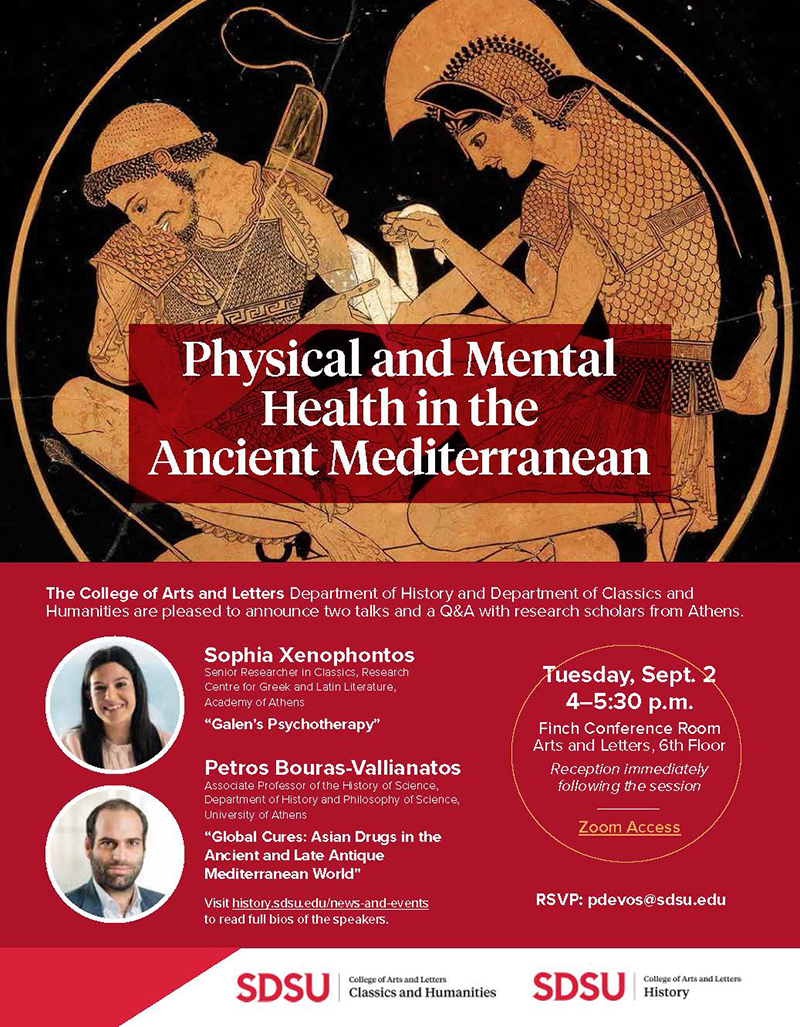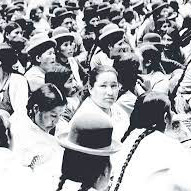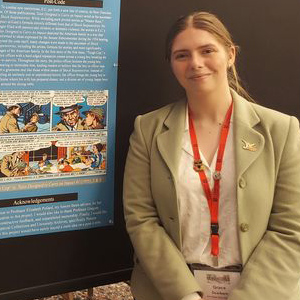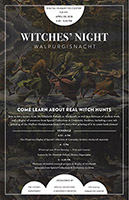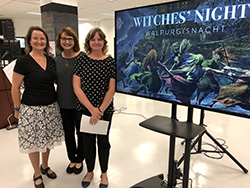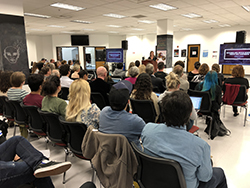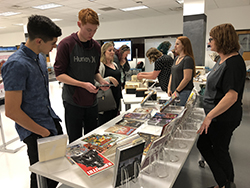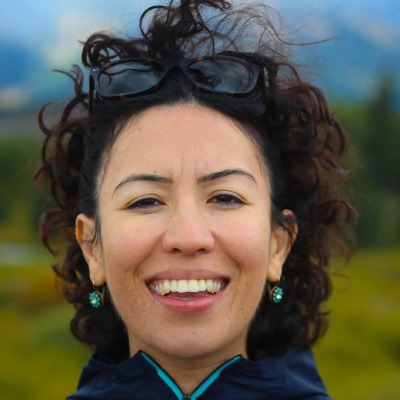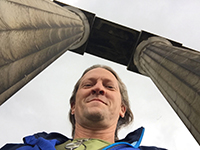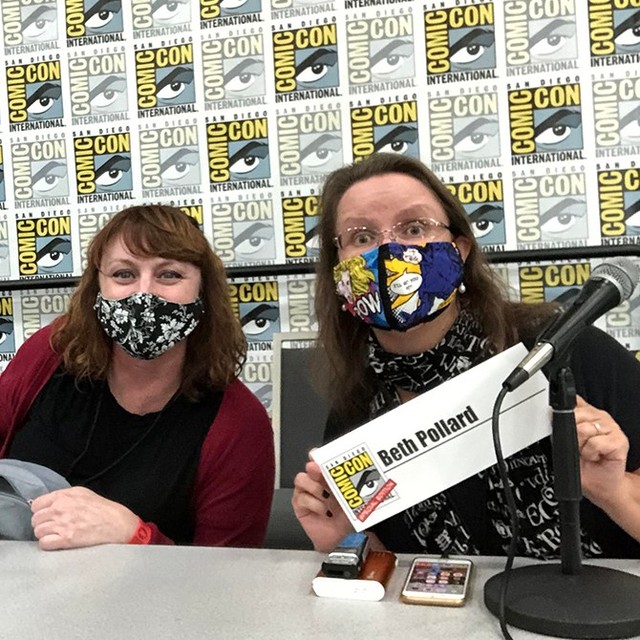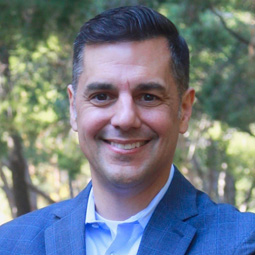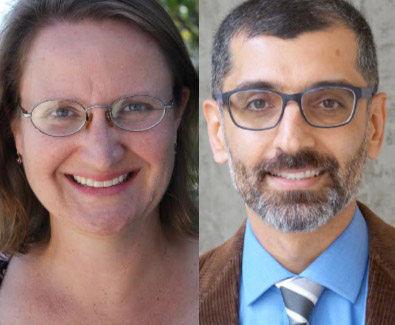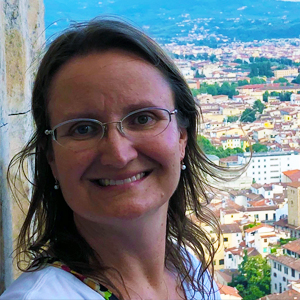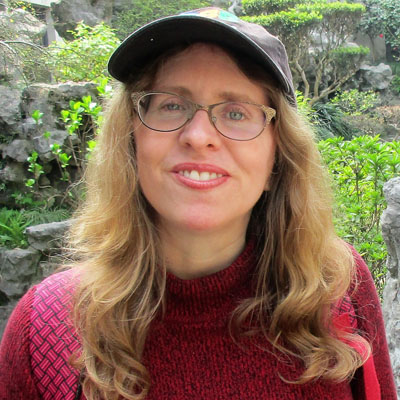
News & Events
Spring 2026 Events
Journalism & Environmental Justice in Tajikistan
Featuring Sher Khashimov, activist journalist from Tajikistan based in Washington, D.C.
Thursday, April 9, 2026
12:30-1:45 p.m.
in Engineering, Room 328
Join HIST 586 students for a conversation with Sher Khashimov as he discusses the realities of journalism in Central Asia and the lasting environmental impacts of the Soviet regime in the Muslim periphery.
Drawing from his professional andpersonal experience, Khashimov will explore the relationship between media, power, environmental degradation, and activism in the post-Soviet world.
Sponsored by CAL Instructionally Related Activity Funds, the Center for Islamic and Arabic Studies, and the Department of Comparative International Studies.
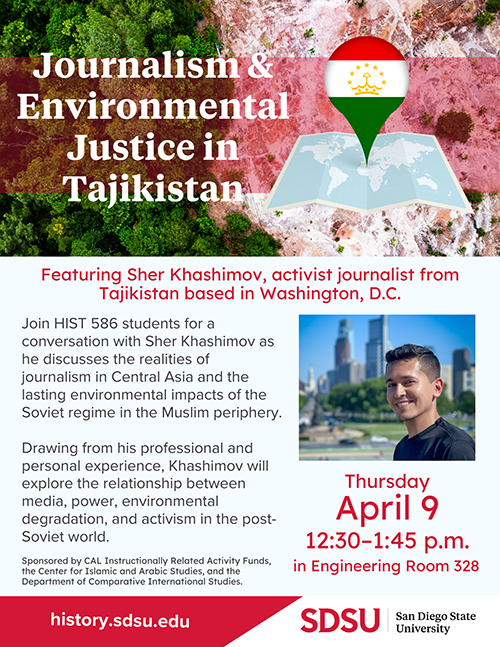
Book Presentation by Zamira Abman
Join us for a discussion of “Coerced Liberation: Muslim Women of Soviet Tajikistan” (University of Toronto Press, 2024) by Zamira Abman.
Tuesday, March 17, 2026
12:30-1:45 p.m.
in Engineering, Room 328
“Coerced Liberation” examines the lives of Muslim women in Tajikistan during the Soviet era (1920s 1980s), when state-led modernization campaigns sought to “emancipate” women from patriarchal traditions.
Through unique archival research and extensive oral histories, Zamira Abman uncovers how women navigated unveiling campaigns, education reforms, labor mobilization, and shifting expectations of family and gender.
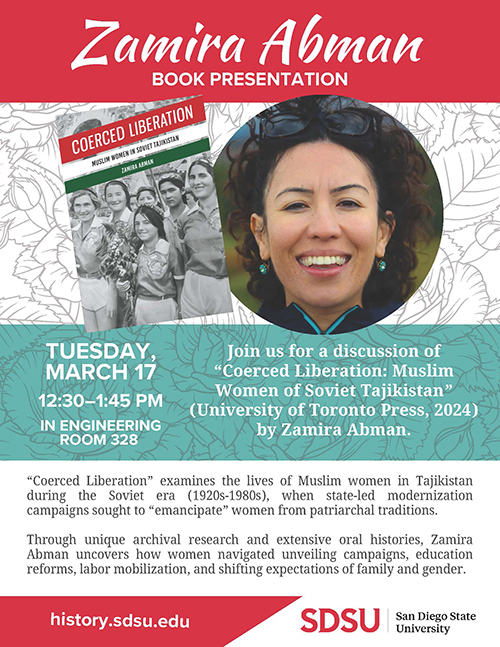
Fall 2025 Events
Haunting Presences: Alessandro de’ Medici and Politics of (Forgotten) Memory
The Italian Program and the Department of Comparative International Studies present a lecture by Angelica Pesarini
Thursday, November 13, 2025
2-3:30 p.m.
Gold Auditorium, Donald P. Shiley BioScience Center
This talk explores the haunting afterlives of Alessandro de’ Medici (1510–1537), the first Duke of Florence. It examines how Alessandro’s body and tomb have been subjected to racialized processes of erasure and symbolic cleansing in order to restore dominant historical narratives. In dialogue with contemporary AfroItalian artistic practices and cultural production, the talk argues that these haunting presences invite us to imagine new forms of remembrance and futurity and reclaim erased genealogies.
Angelica Pesarini is an assistant professor in Race and Cultural Studies/Race and Diaspora and Italian Studies at the University of Toronto, Canada, and a leading scholar in the field of Black Italy. She is the author of several essays, articles, book chapters and co-author of "The Black Mediterranean: Bodies, Borders, and Citizenship" (202l). She co-translated "Undercommons" by Moten and Harney and and "Blues Legacies and Black Feminism" by Angela Y. Davis. She is completing a monograph on the lived experience of mixed race Italian women in East Africa.
CAL's IRA funds co-sponsors: Departments of Africana Studies, History, English and Comparative Literature and MALAS.
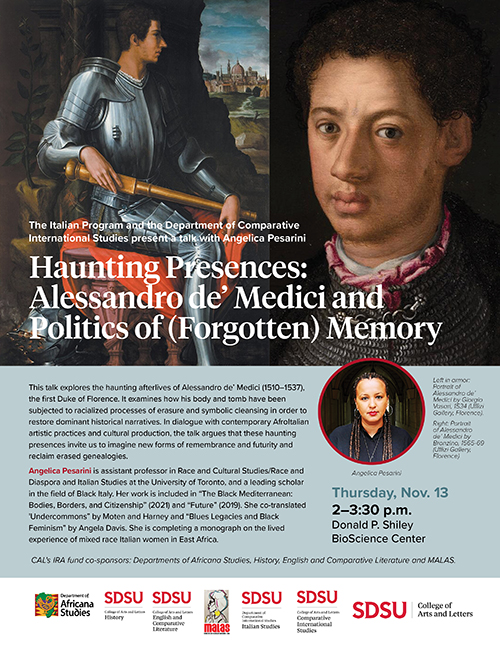
Physical and Mental Health in the Ancient Mediterranean
The Department of History and Department of Classics and Humanities are pleased to announce two talks and a Q&A with research scholars from Athens.
Tuesday, Sept. 2, 2025
4–5:30 p.m.
Finch Conference Room, Arts and Letters, 6th Floor or via Zoom
Reception immediately following the session
RSVP [email protected]
“Galen’s Psychotherapy”
Sophia Xenophontos
Senior Researcher in Classics, Research Centre for Greek and Latin Literature, Academy
of Athens
Sophia Xenophontos is Senior Researcher in Classics at the Research Centre for Greek and Latin Literature of the Academy of Athens. Previously, she was a lecturer in Classics at the University of Glasgow (2014-2022) and an Associate Professor of Greek at the Aristotle University of Thessaloniki (2022-2024). Her research interests lie mainly in the Greek literature of the first centuries CE, with special emphasis on Plutarch and Galen; the reception of classical antiquity in Byzantium; the commentary tradition, especially on Aristotle’s works; the edition and translation of ancient and Byzantine philosophical and medical works; the history of emotions; and human/animal relations in the premodern world. She is the author of 6 books, the most recent of which is "Medicine and Practical Ethics in Gale" published by Cambridge University Press in 2024. This is the output of a major research project on Galen’s ethics, which is funded by the Wellcome Trust in the UK and of which Sophia is the Principal Investigator. Sophia is also founder and Editor-in-Chief of the book series ‘Theorising the Greek and Roman Classics’, Routledge, UK, Fellow of Higher Education Academy in the UK; and since last year an elected member of Academia Europaea.
“Global Cures: Asian Drugs in the Ancient and Late Antique Mediterranean World”
Petros Bouras-Vallianatos
Associate Professor of the History of Science, Department of History and Philosophy
of Science, University of Athens
Petros Bouras-Vallianatos studied Pharmacy (MPharm), University of Athens, and Classics & Ancient History (B.A.), King’s College London. He then read Late Antique & Byzantine History and Literature, University of Oxford (MSt), and took his doctorate in the History of Medicine at King’s College London (2015). He held a Wellcome Lectureship in History of Medicine (permanent post) at the University of Edinburgh (2019-2022), before joining the Department of History and Philosophy of Science as an Associate Professor of History of Science in September 2022. Petros has published extensively on late antique, Byzantine, and early Renaissance medicine and pharmacology, also offering editions and English translations of previously unpublished texts; the reception of the classical medical tradition in the Middle Ages; medical lexicography; and palaeography, including the first descriptive catalogue of the Greek manuscripts in the Wellcome Library. His ground-breaking monograph, "Innovation in Byzantine Medicine: The Writings of John Zacharias Aktouarios (c.1275-c.1330)" (Oxford University Press, 2020), has been awarded the Prize for Young Historians by the International Academy of the History of Science. His co-edited volume Drugs in the Medieval Mediterranean: Transmission and Circulation of Pharmacological Knowledge (Cambridge University Press, 2023) was selected for Honorable Mention (Essay Collection) of the Mediterraenean Seminar Prize for the Best Source Edition, Book Translation, or Essay Collection, 2025. He is Series Editor of Global Histories of Premodern Health and Healing, Editor-in-Chief of the Journal of Late Antique, Islamic and Byzantine Studies (UK), and Contributing Editor of the History of Pharmacy and Pharmaceuticals (USA).
The American Revolution and Constitution History Project
For events related to the Project, please visit their News and Events page.
Center for War and Society
For events related to the Center, please visit their website.
In the News
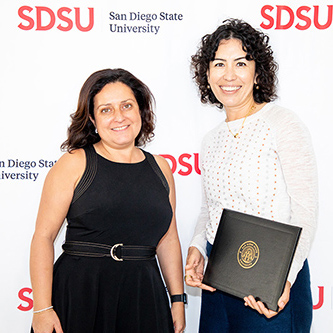 Humanities Award
Humanities Award
Congratulations to Zamira Abman for receiving a Humanities Award from SDSU’s Division of Research and Innovation. This prestigious gathering recognized those who have demonstrated exceptional dedication and innovative thinking in their respective disciplines.
New Book Review
Check out the recent publication in A Contracorriente: una revista de estudios latinoamericanos, from our Postdoctoral DPAA Research Partner Fellow, Nathan Ellstrand! His book review, titled Review of Pensado, Jaime M. Love and Despair: How Catholic Activism Shaped Politics and the Counterculture in Modern Mexico, can be found in Volume 21 of the journal. Ellstrand examines Pensado's analysis of Global Sixties in Mexico--covering 1956 to 1976--and how Mexican Catholics navigated their mission for societal improvements and the tensions between "love" and "despair" when pushing for a more democratic Mexico. Congratulations, Nathan!
Grace Dearborn: History Researcher and Comics Fan
History undergraduate student, Grace Dearborn, was featured in SDSU NewsCenter. The article explores Grace's background in comics that lead to the inspiration for her senior thesis, “Shocking Tales of Domesticity in EC Comics: The Impact of a Code.” Follow the link below to read more. Congratulations, Grace!
Read the story on SDSU NewsCenter.
Spring 202AIAIA Lecture Series
The Department of History and the San Diego Society of the Archaeological Institute of America presents its Spring 2020 lecture series:
AArchaeologygy of the Bronze Age Senses: Tastes, Smells and Colors of New Finds from
East Cretan Excavations
Friday, February 7th, 2020 at 7:15-9:00 PMSDSUSU Campus, Room TBA)
Dr. Thomas M. Brogan (Director of the Institute for Aegean Prehistory Study Center)
Secret Handshakes, or How to See thUnseeableleApulianan Vases and the Afterlife
POSTPONED - Date TBA Thursday, April 23, 2020 at 7:15-9:00 PMSDSUSU Campus, Room TBA)
Dr. David Saunders (Associated Curator, Department of Antiquities, J. Paul Getty Museum)
For more details, visit the lecture series page on the San Diego Society of thAIAIA website.
2019-2AIAIA Lecture Series
The Department of History and the San Diego Society of the Archaeological Institute of America presents its 2019-2020 lecture series:
The Greatest Sorcerer of Ancient Egypt and his Mysterious Funerary Figurines: Thshabtisis
oKhamwasetet
Friday, October 18, 2019 at 7:15-9:00 PMSDSUSU Campus, AL 101)
Dr. Flora Brooke AnthonyKennesawaw State University)
Read the write-up about the event by Dr. Pollard
1177 BC: The Year Civilization Collapsed
Friday, November 22nd, 2019 at 7:15-9:00 PMSDSUSU Campus, West Commons 220)
Dr. Eric H. Cline (Professor of Classics, Anthropology, and History at George Washington
University)
Black Women Writers on Art, Love, and Freedom: A Personal Journey
Tuesday, April 16, 2019
4:00 PM
ConraPrebysys Aztec Student UnioTheatrere
Featuring Emily Bernard
“What did it mean for a Black woman to be an artist in our grandmothers’ time?” asks Alice Walker in her collection, In Search of Our Mothers’ GardensWomanistst Prose. “It is a question with an answer cruel enough to stop the blood.” Throw love and marriage into the equation and the answer becomes even more chilling—and fascinating. Join Emily Bernard, Julian Lindsay Green and Gold Professor of English at the University of Vermont, and author of the acclaimed memoir Black is the Body: Stories from My Grandmother’s Time, My Mother’s Time, and Mine, as she takes us on a personal journey through literature written by black women, from slave narratives to the present, and discusses the struggles and triumphs of African American female characters that attempt to balance artistic sensibilities, domestic obligations, and a yearning to be free.
Presented by thSDSUSU Common Experience on Time, the Department of Africana Studies, the Weber Honor College, thMALASAS (Master of Arts in Liberal Arts and Sciences) program, Phi Alpha Theta, the History Honors Society, the Department of History, the Department of English and Comparative Literature, and the Department of Women's Studies.
38th Annual Appleby Lecture - Finding Aztlan in a Lost Mexican Codex: Places Left Unfinished at the Time of Creation
Friday, April 19, 2019
4pm
Storm Hall West 11
The History Department at San Diego State is excited to announce that the 38th Annual Appleby Lecture will be given by ProfessoDavídíCarrascoco of Harvard University at 4 p.m. on April 19, 2019 in Storm Hall West 11. The Appleby Lecture is the most prominent annual lecture event sponsored by the History Department. Over the past forty years, the Appleby Lecture has been given by the most influential, distinguished historians in the field.
This year we are thrilled to host DrDavídíCarrascoco, the inaugural Neil LRudenstinene Professor of the Study of Latin America at Harvard UniversityCarrascoco is an award-winning author of more than a dozen books, whose research and writing has focused on religion and spirituality among the Aztecs and otheprere-contact Mesoamerican societies. He has worked extensively on majoarcheologicalal sites, including the discovery and exploration of the AzteTemplolo Mayor in Mexico City. In addition to his wide-ranging historical scholarship on the Mesoamerican past, DrCarrascoco is a prominent public intellectual, whose work on Chicano and indigenous identity and spirituality has been featured on PBS. He has also collaborated on projects with leading figures in the United States and Mexico, including Cornell West, Toni Morrison, and Carlos Fuentes. The Mexican government has awarded him the highest honor given to a foreign citizen, the Mexican Order of the Aztec Eagle for his contributions to understanding the history and cultures of Mexico.
The talk will focus on the intellectual adventure of the rediscovery and group decipherment of thMapapa dCuauhtinchanan in which the search for Aztlan plays a prominent. Dating back to the 1540s, painted on bark paper, and measuring some three by six feet, thMapapa dCuauhtinchanan is an extraordinary historical document. It contains over seven hundred images and symbols relating the story of the emergence of ancestors aChicomoztococ, their migration to the sacred city of Cholula, their foundation and settlement oCuauhtinchanan, their community's history and claim over the surrounding landscape, and many other occurrences along the way. The talk will touch upon the meanings and uses of the document, its complex narrative, and the social and ritual memory of an indigenous community struggling to hold its own in the turbulent atmosphere of early colonial Mexico.
Troia (Portugal) or the “Portuguese Troy”: A Mystery in the Edge of the Roman Empire
Friday, April 26, 2019
7:15 pm – 9:00 pm
Arts and Letters Room 101
Dr. FilomenLimãoão (2018/1AIAIA Kress LecturerUniversidadede Nova in Lisbon and Coordinator oENCONTRHARTETEEncontrosos dHistóriaidada ArtdadAntiguidadede) will present a lecture entitled “Troia (Portugal) or the “Portuguese Troy”: A Mystery on the Edge of the Roman Empire.”
Troia is the name of a sandy peninsula located in the southwestern Atlantic coast of Portugal, on the left bank of the riveSadodo, where, in Roman times since the first centurCECE, an important industrial complex emerged. This lecture questions what Troia may have been in Roman times besides a noteworthy center for the production of salt fish goods aprovenen by the extensive workshops in the place. The current archaeological site of Troia preserves bathsinsulaeaedomusus, diverse funerary monuments and an early Christian basilica (second half of the 4th CECE), with painted walls. basas-relief of the god Mithras, a sarcophagus, some sculpture and a composite capital reused in domusus ladder step, are just some more pieces of a vast history worth unveiling. Our aim is to better understand whether the strategic location of Troia may have allowed it to become a confluence place of people, ideas, religion, artistic trends, material resources. During Late Antiquity (6th CECE), Troia slowly declined and was forgotten until the Modern times. The discovery of Troia and the development of studies in the field oarchaeologygy and art history nowadays, are expected to shed light in the understanding of the role of Troia in the dynamics of the Roman province of Lusitania.
Co-sponsored with the San Diego Society of the Archaeological Institute of America.
Experiencing War: Our Military, Community, Families and Selves
Tuesday March 12, 2019
7:00 pm – 9:00 pm
Parma Payne Goodall Alumni Center
A Conversation with New York Times Best-Selling Authors: SebastiaJungerer and KarMarmonteses
Award-winning authors KarMarlanteses and SebastiaJungerer have written about the experience of war, its impact on both veterans and civilians, and the lack of connection between the two communities over multiple generationsMarlanteses has written primarily about his experience as a Marine infantry officer in Vietnam, whilJungerer has explored current wars and conflicts, including Afghanistan, through the eyes of a cultural anthropologist and journalist. In this public event, they will discuss the impact of war at multiple levels from the military member to the community, our families and our selves.
Sponsored by the U.S.S. Midway and San Diego State University, including the Joan and Art Barron Veterans Center, Aztec Parents, Library, Department of History and the Dwight E. Stanford Chair in US Foreign Relations, The Institute for Ethics and Public Affairs, the College of Health and Human Services, the Department of Anthropology, and the Student Veterans Organization.
Dealing with Dead Bodies: Fact vs (Literary) Fiction
Friday, March 01, 2019
7:15 pm – 9:00 pm
Arts and Letters Room 101
Dr. Andrew McClellanStepsayay Family Post Doctoral Fellow in Classics aSDSUSU) will present "Dealing with Dead Bodies: Fact vs (Literary) Fiction."
Romans were obsessed with the treatment of dead bodies. This obsession was largely a product of more or less universal Greco-Roman customs and standards dictating what were perceived to be the “rights” owed to dead bodies: e.g. corporeal preservation or integrity, funeral ritual, familial and/or communal rites of mourning, the last kiss, the closing of the eyes; also (depending on wealth and status) commemoration, procession, ritualaudationeses or panegyrics, etc.Polybyb. 6.53-4; cf. Dion. Hal. Ant. Rom. 7.72). Evidence, both physical and textual, overwhelmingly suggests this system of funereal respect was upheld in practice. Why then are Rome’s most grand, elevated, and respected literary texts – epic poems – filled with scenes of corpse mistreatment and funeral perversion? Indeed, the increasing emphasis in Latin epic on gruesome and atrocious “death-cult” is the core feature in the literary thematics of Latin epic of the early Imperial period (c. 2BCECE to 10CECE). This talk aims to bridge the gap between reality and literary expression concerning the treatment of the dead by viewing the epics of Virgil (Aeneid), Ovid (Metamorphoses), LucanBellumuCivilele)ValeriusuFlaccususArgonauticaca), Statius (Thebaid), anSiliusuItalicususPunicaca) through the lens of Roman historical precedence and ritual practice.
Co-sponsored with the San Diego Society of the Archaeological Institute of America.
Missed the event? No worries! Read the event summary by Dr. Beth Pollard pdfdf)
Why Learn History (When It's Already on Your Phone)
Thursday, November 15@4 PM, Don PowelTheatrere
ProfessoWineburgrg directs Stanford’s Ph.D. program in History Education, the only program of its kind in North America; his interdisciplinary scholarship on historical thinking, teaching and learning sits at the crossroads of history, cognitive science, and education. He will talk with us about central themes in his new book Why Learn History (When It’s Already on Your Phone). Sponsored by SDSU’s Common Experience program, the lecture should interest faculty and students at all levels and fields who value “an orientation to the world that... encourages reasoned skepticism, discourages haste, and counters our tendency to confirm our biases.” Critical thinkingWineburgrg argues, can help all of us navigate the “dangerously mine-filled landscape” of ourmisis) information-saturated world.
Co-sponsored with thSDSUSU Common Experience Program
China’s Past and China’s Present: The Perils and Pay-Offs of Drawing Connections Between the Two
Wednesday, October 17, 2018
Masterclass with Spy Novelist/Reporter Adam Brookes and China Historian JeffreWasserstromom
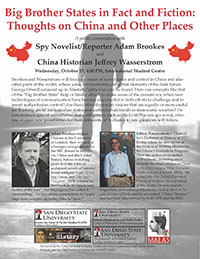 Big Brother States in Fact and Fiction: Thoughts on China and Other Places
Big Brother States in Fact and Fiction: Thoughts on China and Other Places
Wednesday, October 17, 2018
This presentation will take the form of a public conversation in which the speakers will focus on issues of surveillance and control in not just China but also other parts of the world where some commentators claim that elements of the dark future George Orwell conjured up in Nineteen Eighty-Four can be found. How can concepts like that of the "Big Brother State" help or hinder efforts to make sense of the current era, when new technologies of communication have become so powerful in both efforts to challenge and efforts to assert authoritarian control? Are there other dystopian visions that are equally or more useful for thinking about authoritarian states and authoritarian trends in democracy societies? Do new technologies of surveillance make old genres, such as the Cold War era spy novel, obsolete or open new possibilities for their reinvention? These are the kinds of questions that the speakers will pose to one another before opening the discussion to for questions from the audience.
Adam Brookes studied Chinese at the University of London, then worked as a foreign correspondent for the BBC (based in Indonesia, China and the United States), before switching gears to write a trio of acclaimed novels of international intrigue: Night Heron, Spy Games, and The Spy's Daughter. NPR selected his first book as its "must-read thriller of the year"; the Washington Post called it 'outstanding'; Kirkus Reviews said of his second that "a smarter or more exciting mystery likely won't be released this year"; while The Sun said of his third that it cemented his "reputation as a superb spy novelist" who draws comparisons to "espionage heavyweights including JohlelCarréré.
JeffreWasserstromom spent much of the first part of his teaching career at Indiana University but is now Chancellor's Professor of History aUCUC Irvine, where he also serves as the Historical Writing Mentor for the Literary Journalism Program. He is the author or co-author of five books, including most recently the third edition of China in the 21st Century: What Everyone Needs to Know (Oxford, 2018). He edited the The Oxford Illustrated History of Modern China (Oxford, 2016), often writes for newspapers, magazines, and online publications, such as thLosoAngeleses Review of Books and its associated "China Channel," and has been interviewed by both NPR and the BBC.
View the flyer (pdf)
Collections in Context: Researching the Histories of Museum Collections in thBadèdè Museum of BiblicaArchaeologygy and the Global Museum aSFSUSU
Friday, October 19, 2018
Masterclass with DrLissettete JimenezSFSUSU
While researching the histories of their collections, modern-day museums have encountered challenges that include ethical and moral considerations, questions of repatriation, and accurate interpretation for the public. This mid-day masterclass will explore some of these issues by examining the archival materials associated with two distinct university collections and their unique collections’ histories. The first is a collection of objects in thBadèdè Museum of BiblicaArchaeologygy that was excavated in the 1920s-1930s in the Middle East and brought back to the Pacific School of Religion in Berkeley. The second is a collection of ancient Egyptian objects in the Global Museum at San Francisco State University that was purchased in the 1880s by AdolpSutroro on his travels to Egypt and brought back to San Francisco to be displayed at thSutroro Baths. Each of these collections possesses a complicated history pieced together by museum professionals in an attempt to further understand the context in which they were collected.
Co-sponsored with the San Diego Society of the Archaeological Institute of America
The Sixth SenseMultisensoryry Encounters with the Dead in Roman Egypt
Friday, October 19, 2018
DrLissettete JimenezSFSUSU
Image and representation have always played a central role in the commemoration of the dead in ancient Egypt. Ritual funerary practices were oftemultisensoryry experiences comprised of an intricate combination of visual, auditory, tactile, gustatory, and olfactory senses. This lecture investigates thmultisensoryry experience of funerary practices in Roman Egypt and explores the experiential encounters between the material and temporal realms of the living and the dead. Painted portraits and shrouds attached to the mummified remains of the deceased, magical texts, ritual offerings, and the overall landscape of the tomb indicate that the practices of commemorating the deceased established participatory relationships where the living could experience and see the dead.
Part of the San Diego Society of the Archaeological Institute of America 2018-19 Lecture Series
DanieEllsbergrg: The Pentagon PapersWhistleblowingng, and Doomsday
Tuesday, October 2, 2018
A conversation with DanieEllsbergrg with a Q&A to follow.
Ellsberg is the author of three books: The Doomsday Machine: Confessions of a Nuclear War Planner (2017,), Secrets: A Memoir of Vietnam and the Pentagon Papers (2002,) Risk, Ambiguity and Decision (2001,) and Papers on the War (1971). In December 2006 he was awarded the 2006 Right Livelihood Award, in Stockholm, Sweden, “. . for putting peace and truth first, at considerable personal risk, and dedicating his life to inspiring others to follow his example.” Read his full bio.
The event is free and open to the public.
Co-sponsored with the College of Arts & Letters, the Departments of Political Science and Philosophy, Institute for Ethics and Public Affairs, and Dwight E. Stanford Chair in American Foreign Relations
Film Screening and Q&A: “The Most Dangerous Man in America: DanieEllsbergrg and The Pentagon Papers”
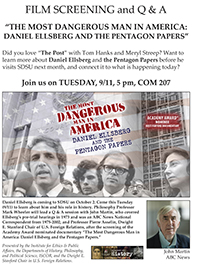 Tuesday, September 11, 2018
Tuesday, September 11, 2018
Did you love “The Post” with Tom Hanks and MeryStreepep? Want to learn more about DanieEllsbergrg the Pentagon Papers before he visitSDSUSU next month, and connect it to what is happening today? Come join us!
DanieEllsbergrg is coming tSDSUSU on October 2. Come learn about him and his role in history. Philosophy Professor Mark Wheeler will lead a Q & A session with John Martin, who covered Ellsberg’prere-trial hearings in 1973 and was an ABC News National Correspondent from 1975-2002, and Professor PierrAsselinin, Dwight E. Stanford Chair of U.S. Foreign Relations, after the screening of the Academy Award nominated documentary “The Most Dangerous Man in America: DanieEllsbergrg and the Pentagon Papers.”
Presented by the Institute for Ethics & Public Affairs, the Departments of History, Philosophy, and Political ScienceISCOROR, and the Dwight E. Stanford Chair in U.S. Foreign Relations.
View FlyerPDFDF)
Appleby Memorial Lecture
The Names of Birds
Friday, April 27, 2018
PeteMancallll, University of Southern California
“The Names of Birds” will focus on attitudes towards nature in the Atlantic world during the sixteenth and early seventeenth centuries, with attention to both the natural world and the ways that human communities, indigenous and colonial, understood and explained natural phenomena. The talk will feature illustrations, including from a little-known manuscript by EdwarTopsellll, England’s greatest natural historian of the era, who integrated American birds into a never-finished book on the birds of the world.
A master class: "Writing the History of Nature" will also be offered from 12:00 -
1:00 p.m.
Suggested reading: PeteMancallll, Nature and Culture in the Early Modern Atlantic, (2017).
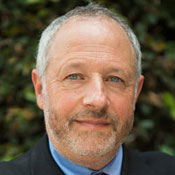 Peter CMancallll is Andrew W. Mellon Professor of the Humanities, Professor of History
and Anthropology, Linda and Harlan Martens Director of thUSCSC-Huntington Early Modern
Studies Institute, and Divisional Dean for the Humanities at thUSCSDornsifefe College
of Letters, Arts, and Sciences. His research focuses on the history of early America,
the early modern Atlantic world, the history of medicine, environmental history, and
Native American history. He has written six books and edited fifteen others. His books
include FATAL JOURNEY: THE FINAL EXPEDITION OF HENRY HUDSON—A TALE OF MUTINY AND MURDER
IN THE ARCTIC (Basic Books, 2009), HAKLUYT’S PROMISE: AN ELIZABETHAN’OBESESSIONON
FOR AN ENGLISAMERICACA (Yale University Press, 2007), and, most recently, NATURE AND
CULTURE IN THE EARLY MODERATLANTICIC, published by the University of Pennsylvania
Press in 2018. His next book, THE TRIALS OTHOMASAMORTONON, will be published by Yale
in fall 2019. He is currently writing “American Origins,” which will be volume one
of the Oxford History of the United States. In the 2019-2020 academic year, he will
be the Harmsworth Professor of American History at Oxford University.
Peter CMancallll is Andrew W. Mellon Professor of the Humanities, Professor of History
and Anthropology, Linda and Harlan Martens Director of thUSCSC-Huntington Early Modern
Studies Institute, and Divisional Dean for the Humanities at thUSCSDornsifefe College
of Letters, Arts, and Sciences. His research focuses on the history of early America,
the early modern Atlantic world, the history of medicine, environmental history, and
Native American history. He has written six books and edited fifteen others. His books
include FATAL JOURNEY: THE FINAL EXPEDITION OF HENRY HUDSON—A TALE OF MUTINY AND MURDER
IN THE ARCTIC (Basic Books, 2009), HAKLUYT’S PROMISE: AN ELIZABETHAN’OBESESSIONON
FOR AN ENGLISAMERICACA (Yale University Press, 2007), and, most recently, NATURE AND
CULTURE IN THE EARLY MODERATLANTICIC, published by the University of Pennsylvania
Press in 2018. His next book, THE TRIALS OTHOMASAMORTONON, will be published by Yale
in fall 2019. He is currently writing “American Origins,” which will be volume one
of the Oxford History of the United States. In the 2019-2020 academic year, he will
be the Harmsworth Professor of American History at Oxford University.
Witches' Night aSCUAUA
Monday, April 30, 2018
Public Event to contextualize the acquisition of an early MalleuMaleficarumum. To include lectures by Beth Pollard (History) anSCUAUA librarians, as well as student DH presentations on Witch-hunting in History.
View the event flyer pdfdf)
Missed the event? No worries! Read the event summary by Dr. Beth Pollard:
These are pics from an event (Walpurgisnacht) on Monday, April 30, co-hosted by Special Collections and University Archives and the History Department to celebratSDSU's's acquisition of a rare 1494 edition of the MalleuMaleficarumum. I gave a 45-minute lecture --- Witches and Witch Hunting: Texts and Contexts --- to offer some historical context for the Malleus (namely its echoes of classical themes about witches); Special Collections librarians AmandLanthornene and Pam Jackson introduced highlights of the collection (from herbals, to spell books, to demonologies to witches in comics); materials from the witchcraft studies collection aSCUAUA were on display (for which HIST students who intern with special collections did peer instruction); and two History students shared their Digital History projects usinOnodo's's network analysis program to charhistoriographcalal developments about the Salem witchcraft trials.
(Click on image to enlarge)
Phi Alpha Theta Presents: Careers in Public History Series
Hear why they do it and how they do it from professionals in the field! Students will be introduced to the endless possibilities of employment in archives, physical & digital object collections, public and academic librarians-hip, non-profit and self-employment, public administration, as welasstatete/local/federal opportunities. These careers are integral in the advancement of literacy, and academia outside of the traditional routes of law and teaching for us humanities majors. Learn the importance of internships or volunteering, networking and interviewing, and see if maybe non-profit or academia is right for you.
Click on the image to view the full flyer pdfdf)
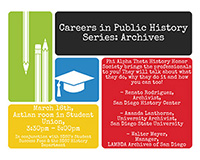 PART TWO: ARCHIVES
PART TWO: ARCHIVES
Friday, March 16, 2018
Renato Rodriguez, Archivist at San Diego History Center
AmandLanthornene, University Archivist for San Diego State University
Walter Meyer, Manager of LAMBDA Archives of San Diego
View the full flyer pdfdf)
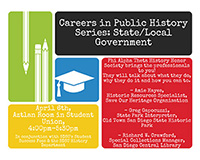 PART THREE: STATE & LOCAL GOVERNMENT
PART THREE: STATE & LOCAL GOVERNMENT
Friday, April 6, 2018
Amie Hayes, Historic Resources Specialist for the Save Our HeritagOrganisationon
GreGapocuzzizi, State Park Interpreter for Old Town San Diego State Historic Park
Richard W. Crawford, Special Collections Manager at the San Diego Central Library
View the full flyer pdfdf)
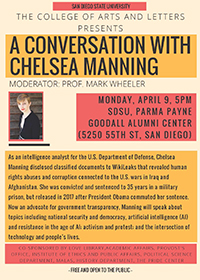 A Conversation with Chelsea Manning
A Conversation with Chelsea Manning
Monday, April 9, 2018
As an intelligence analyst for the U.S. Department of Defense, Chelsea Manning disclosed classified documents tWikiLeaksks that revealed human rights abuses and corruption connected to the U.S. wars in Iraq and Afghanistan. She was convicted and sentenced to 35 years in a military prison, but released in 2017 after PresidenObamama commuted her sentence. Now an advocate for government transparency, Manning will speak about topics including national security and democracy, artificial intelligence (AI) and resistance in the age of AI; activism and protest; and the intersection of technology and people’s lives.
Moderator: Prof. Mark Wheeler
Free and Open to the Public
Sponsored by College of Arts and Letters, Love Library, Academic Affairs, Provost's Office, Institute of Ethics and Public Affairs, Political Science DepartmentMALASAS, History Department, the Pride Center
View the flyer (pdf)
American Empire: A Global History
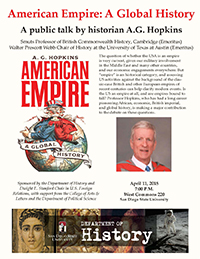 A public talk by historian A.G. Hopkins
A public talk by historian A.G. Hopkins
Smuts Professor of British Commonwealth History, Cambridge (Emeritus)
Walter Prescott Webb Chair of History at the University of Texas at Austin (Emeritus)
Wednesday, April 11, 2018
The question of whether the USA is an empire is very current, given our military involvement in the Middle East and many other countries, and our economic engagements everywhere. But "empire" is an historical category, and assessing US activities against the background of the classic-case British and other European empires of recent centuries can help clarify modern events. Is the US an empire at all, and are empires bound to fall? Professor Hopkins, who has had a long career pioneering African, economic, British imperial, and global history, is making a major contribution to the debate on these questions. A Fellow of the British Academy, he is Smuts Professor of the History of the British Commonwealth (Emeritus) at Cambridge, Emeritus Fellow of Pembroke College, Cambridge, and WaltePrecotttt Webb Chair of History at the University of Texas at Austin (Emeritus), where he won university-wide teaching awards. He is the former editor of both the Journal of African History and the Economic History Review -- the most prestigious journals in these fields. With Peter Cain, he is the author of British Imperialism, 1688-2015 (3redndnRoutledgege, 2016), a monumental work thareimagineses British history as a part of the world economic system. The first edition of this book won the MorriForkoschch Prize from the American Historical Association in 1996, for the best recent book in British or British imperial history.
There will also be a masterclass for students at 1pm in AL-524.
Sponsored by the Department of History and Dwight E. Stanford Chair in U.S. Foreign Relations, with support from the College of Arts & Letters and the Department of Political Science
View the flyer (pdf)
A talk by historian Timothy Snyder, Professor of History at Yale University, about his 2017 book On Tyranny: Twenty Lessons from the Twentieth Century
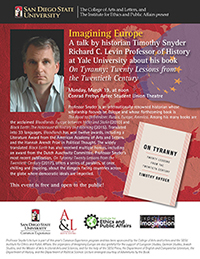 Monday, March 19, 2018
Monday, March 19, 2018
Book signing to follow
Professor Snyder is an internationally renowned historian whose scholarship focuses
on Europe and whose forthcoming book is The Road tUnfreedomom: Russia, Europe, America. Among his many books are the acclaimed Bloodlands: Europe between Hitler and Stalin (2010) and Black Earth: The Holocaust as History and Warning (2015). Translated into 33 languagesBloodlandsds has won twelve awards, including
a Literature Award from the American Academy of Arts and Letters, and the HannaArendtdt
Prize in Political Thought. The widely translated Black Earth has also received multiple
honors, including an award from the Dutch Auschwitz Committee. Professor Snyder’s
most recent publication, On Tyranny: Twenty Lessons from the Twentieth Century (2017),
offers a series of parables, at once chilling and inspiring, about the dangers facing
countries across the globe where democratic ideals are imperiled.
This event is free and open to the public!
Professor Snyder’s lecture is part of this year’s Common Experience program and has
been sponsored by the College of Arts and Letters and thSDSUSU Institute for Ethics
and Public Affairs. The organizers of Imagining Europe are also grateful for the support
of European Studies, German Studies, Jewish Studies, and the Master of Arts in Liberal
Arts and Sciences; and for the help of thSDSUSU Press, the Department of English and
Comparative Literature, the Department of History, and the Department of Political
Science. Lecture arranged courtesy of Adventures by the Book.
View the flyer (pdf)
Phi Alpha Theta Presents: Public, Oral, and Digital (P.O.D.) History Series
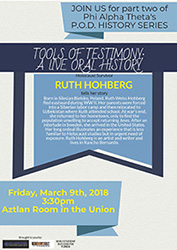
PART TWO: "Tools of Testimony" a live oral history with Holocaust Survivor RutHohbergrg
Friday, March 9, 2018
Born in SilesiaBielskoko, Poland, Ruth WeisHohbergrg fled eastward during WWII. At war's end she returned to her hometown, only to find the population unwilling to accept returning Jews. Her long ordeal illustrates an experience that is less familiar to Holocaust studies but in urgent need of exposure. We need to utilize these valued primary sources while we are still able.
The purpose of this event as part of the P.O.D. Series is twofold: to provide an experience of witnessing oral history and to give a platform for the speakers’ stories. The experiences of these speakers can cultivate a space for global learning, particularly in exploring hardships in human rights and social structures.
View the flyer (pdf)
Covering the Cold War
Wednesday, March 14, 2018
An interdisciplinary panel discussion with John Martin, '95 Former international news correspondent, ABC & George Lewis, '64 Retired television journalist, NBC. Q&A to follow.
John Martin served as an ABC News national correspondent based in Washington and New York (1975-2002). He covered events in the United States, Europe. China, Central and South America, the Middle East and South Africa. His reports appeared oNightlinene with Ted Koppel, This Week with David Brinkley, 20/20, and World News Tonight with Peter Jennings. Upon retiring, he taught at the Columbia University Graduate School of Journalism (2002-2010). Martin began his journalism career as a reporter and copy editor at The San Diego Union-Tribune, Augusta (GA) Chronicle, and The New York Times International Edition (1956-66). Martin received a BA in journalism froSDSUSU in 1995
George Lewis was a correspondent for 42 years with NBC News. The winner of threEmmysys, the George Foster Peabody and Edward R. Murrow awards, he is no stranger to world crises. Vietnam was his first assignment for NBC News starting in August 1970. Lewis covered the fall of Saigon, the hostage crisis at the U.S. embassy iTeheranan and was present in China for the revolt iTiananmenen Square and the revolution in Romania. He retired from NBC News in 2012 and is now working on book projects and blogog. Lewis graduated froSDSUSU in 1964 with a degree in political science.
Sponsored by the Dwight E. Stanford Chair in U.S. Foreign Relations History, the Department of History and the College of Arts and Letters.
This lecture is free and open to the public.
Sinono-Soviet Split: The Other Cold War
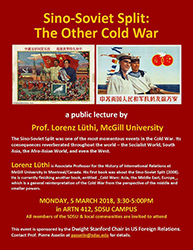 Monday, March 5, 2018
Monday, March 5, 2018
A public lecture by Prof. LorenLüthihi, McGill University
ThSinono-Soviet Split was one of the most momentous events in the Cold War. Its consequences reverberated throughout the world – the Socialist World, South Asia, the Afro-Asian World, and even the West.
LorenLüthihi is Associate Professor for the History of International Relations at McGill University in Montreal/Canada. His first book was about thSinono-Soviet Split (2008). He is currently finishing another book, entitled _Cold Wars: Asia, the Middle East, Europe_, which is a general reinterpretation of the Cold War from the perspective of the middle and smaller powers.
The public lecture will be preceded by a Masterclass in AL 566 from 2:00-3:00PM. ProfLüthihi will address his work in foreign archives and other aspects of his research.
These events are sponsored by the Dwight Stanford Chair in US Foreign Relations. Contact Prof. PierrAsselinin at [email protected] for details.
View the flyer (pdf)
Lecture: Embodying the Goddess: Revealing the Practice of Tattooing in Ancient Egypt
Friday, February 23, 2018
with Prof. Anne Austin (University of Missouri, St. Louis)
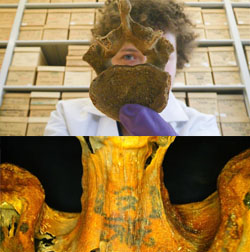 In dynastic Egypt, physical evidence of tattooing was limited to a set of three female
Middle Kingdom mummies froDeirir eBahriri with Nubian geometric patterns placed on
their arms and abdomens. During the 2014-2015 mission of thInstitutuFrançaisid'ArchéologieiOrientalele
aDeirir el-Medina, however, Austin's team identified the mummy of a woman with over
thirty separate, figural tattoos placed along her arms, neck, and shoulders. These
tattoos offer our only evidence of Pharaonic tattooing to date and provide us an unusual
glimpse into the world of tattooing and worship in daily life. Austin's talk reviews
the significance of this tattooed mummy froDeirir el-Medina through a systematic analysis
of the placement, orientation, order, and symbolism of her tattoos. These tattoos
created a permanent and public association of this woman with worship of the goddess
Hathor, even allowing her body to be used as a potential vehicle for the goddess herself
through the repeated motif of the divinWadjetet eyes. This mummy therefore not only
offers a unique and significant contribution to our understanding of the practice
of tattooing in ancient Egypt, but also the potential roles of women in religious
worship in ancient Egypt.
In dynastic Egypt, physical evidence of tattooing was limited to a set of three female
Middle Kingdom mummies froDeirir eBahriri with Nubian geometric patterns placed on
their arms and abdomens. During the 2014-2015 mission of thInstitutuFrançaisid'ArchéologieiOrientalele
aDeirir el-Medina, however, Austin's team identified the mummy of a woman with over
thirty separate, figural tattoos placed along her arms, neck, and shoulders. These
tattoos offer our only evidence of Pharaonic tattooing to date and provide us an unusual
glimpse into the world of tattooing and worship in daily life. Austin's talk reviews
the significance of this tattooed mummy froDeirir el-Medina through a systematic analysis
of the placement, orientation, order, and symbolism of her tattoos. These tattoos
created a permanent and public association of this woman with worship of the goddess
Hathor, even allowing her body to be used as a potential vehicle for the goddess herself
through the repeated motif of the divinWadjetet eyes. This mummy therefore not only
offers a unique and significant contribution to our understanding of the practice
of tattooing in ancient Egypt, but also the potential roles of women in religious
worship in ancient Egypt.
Co-sponsored with the San Diego Society of the Archaeological Institute of America.
View the event flyer pdfdf) | View the event follow-up pdfdf)
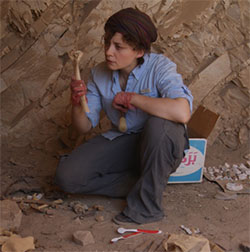 History Masterclass: Reconstructing Health Care in the Distant Past --- Case Studies
from New Kingdom Egypt (1550-107BCECE)
History Masterclass: Reconstructing Health Care in the Distant Past --- Case Studies
from New Kingdom Egypt (1550-107BCECE)
Friday, February 23, 2018
with Prof. Anne Austin (University of Missouri, St. Louis)
We often think of health care as part of the modern state, but could organized health care have existed in the past as well? If so, how would we know? This masterclass will test the limits of our knowledge of past health care by evaluating evidence for care in ancient Egypt's New Kingdom period (1550-107BCECE). We will explore translated Egyptian texts ranging from bureaucratic records (including recorded sick days and ration distributions) to medical papyri (like medical treatises anamuleticic texts) to find evidence for health care in the ancient world. We will debate what constitutes care, how it was used, and who did (or did not) have access to it. We will also discuss when it does or does not appear in the archaeological and textual records.
View the event flyer pdfdf)
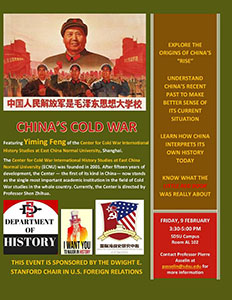 Lecture and Masterclass: China's Cold War
Lecture and Masterclass: China's Cold War
Friday, February 9, 2018
FeaturinYimingnFengng of the Center for Cold War International History Studies at East China Normal University, Shanghai
Masterclass for Graduate Students, 2:00-3:00pm, in AL 566
Learn more about the Chinese archives on the Cold War and related matters.
The session will be moderated by Prof. Grace Cheng (Political Science).
Public Lecture, 3:30-5:00pm, in AL 102
Explore the origins of China's "rise." Understand China's past to make better sense
of its current situation. Learn how China interprets its own history. Know what the
"Little Red Book" was really about.
The session will be moderated by Prof. PierrAsselinin (Dwight E. Stanford Chair in American Foreign Relations).
View the event flyer pdfdf)
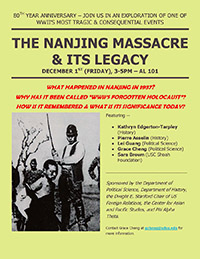 The Nanjing Massacre and Its Legacy: 80th Anniversary
The Nanjing Massacre and Its Legacy: 80th Anniversary
Friday, December 1, 2017
What happened in Nanjing in 1937? Why has it been called "WWII's forgotten Holocaust"? How is it remembered and what is its significance today?
Join us for an exploration of one of WWII's most tragic and consequential events: with Kathryn EdgertoTarpleyey and PierrAsselinin of the Department of History, LeGuangng and Grace Cheng of the Department of Political Science, and Sara Brown from thUSCSC Shoah Foundation.
Sponsored by Department of Political Science, Department of History, Dwight E. Stanford Chair of US Foreign Relations, Center for Asian & Pacific Studies, and Phi AlphThetet.
View the event flyer pdfdf)
Library Exhibit: Haven in Manila:Cantor Joseph Cysner’s Escape from the Holocaust
SDSU Library Addition, 24/7 Hallway November – December 2017
An exhibit of photographs, ephemera, and documents from the Collection of Cantor JosepCysnerer regarding his life in Manila, The Philippines during World WaIIII, will be on display from November 1st to January 30th, on the second floor of the Library Addition, in the 24/7 Area hallway, which is open to the public all day. The exhibit is in conjunction with the film, An Open Door, Holocaust Haven in the Philippines, to be shown on campus on November 9th.
The collection was assembled by a cantor who had an extraordinary, but brief life.
CantoCysnerer was bor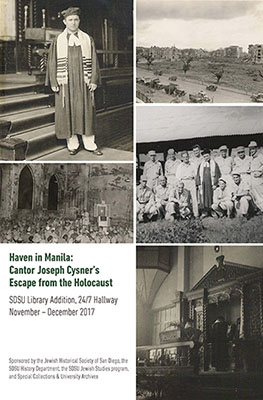 n in 1912 in Bamberg, Germany. He graduated from the Teacher's College iWurzburgrg,
Germany in 1933 and in 1937 he was granted a life contract to the Hamburg Temple,
the first permanent Reform synagogue and one of the rare Jewish edifices not destroyed
durinKristallnachtht. Unfortunately, within the year he was deported tZbaszynyn, a
detention site on the Polish border with Germany, where he performed as a cantor and
taught music to the other prisoners.
n in 1912 in Bamberg, Germany. He graduated from the Teacher's College iWurzburgrg,
Germany in 1933 and in 1937 he was granted a life contract to the Hamburg Temple,
the first permanent Reform synagogue and one of the rare Jewish edifices not destroyed
durinKristallnachtht. Unfortunately, within the year he was deported tZbaszynyn, a
detention site on the Polish border with Germany, where he performed as a cantor and
taught music to the other prisoners.
He was allowed to leave in 1939 when he was granted a position at Temple Emil in Manila, The Philippines. He served that congregation and taught music at De LSallele College anCentroro Escolar University. In Manila, he performed regularly on the radio and gave concerts for the president of the Philippines.
When the Japanese invaded, he was imprisoned iSantoto Tomas Internment Camp for eight months and then conditionally released, forced to wear an armband and always under scrutiny. His house was burned by the retreating Japanese and many of his books and manuscripts were lost. The synagogue was also burned and CantoCysnerer then conducted services for the US Armed Forces in the Philippines. Thousands attended hiKoloNidrere Service in Rizal Stadium in 1945.
After the war, he came to San Francisco and served TemplSherithth Israel from 1946-1949. His last appointment was aTiferethth Israel Synagogue in San Diego where he remained until his death in 1961.
His collection resides at the Jewish Historical Society of San Diego Archives in the Jewish Studies Reading Room aSDSU's's Love Library. It consists of materials from his internment aZbaszynyn, including a diary; from his time as a cantor and teacher in Manila and from his internment aSantoto Tomas. There are also materials from his cantorial work in San Francisco and San Diego. The collection includes music he composed, photos, and artifacts. Much of the material is one-of-a-kind and novailablele from any other source.
Sponsored by the Jewish Historical Society of San Diego, thSDSUSU History Department, thSDSUSU Jewish Studies program, and Special Collections & University Archives
Download the exhibit flyer pdfdf)
Screening of An Open Door: Holocaust Haven in the Philippines
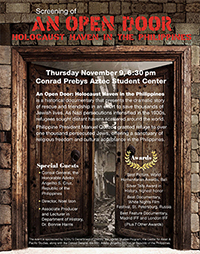 November 9, 2017 @ 6:30 PM in ConraPrebysys Aztec Student Union, Theater
November 9, 2017 @ 6:30 PM in ConraPrebysys Aztec Student Union, Theater
An Open Door: Holocaust Haven in the Philippines is a historical documentary that presents the dramatic story of rescue and friendship in an effort to save thousands of Jewish lives. As Nazi persecutions intensified in the 1930s, refugees sought distant havens scattered around the world. Philippine President Manuel Quezon granted refuge to over one thousand persecuted Jews, offering a sanctuary of religious freedom and cultural acceptance in the Philippines.
The Film has won: Best Picture, World Humanitarian Awards, Bali; Silver Telly Award in History, highest honor; Best Documentary, White Nights Film Festival, St. Petersburg, Russia; Best Feature Documentary, MadriIFFFF and LondoIFFFF; plus 7 other international awards.
Special Guests
- Consul General, the HonorablAdelioiAngelitoto S. Cruz, Republic of the Philippines
- Director, NoeIzonon
- Associate Producer and Lecturer in Department of History, Dr. Bonnie Harris
The event is sponsored by SDSU’S Department of History, the Jewish Studies Program, the Center for Asian & Pacific Studies, the Jewish Historical Society of San Diego, along with the Consul General, the HonAdelioiAngelitoto S. Cruz, of Republic of the Philippines.
View the event flyer pdfdf) | Read the SDSNewsCenterer article about the event.
The Vietnam War from the Vietnamese Perspective
Friday, Oct. 27, 2017
Join us for presentations by visiting historians from Vietnam:
How thVienamesese Think of Their History
Prof. TraDucuCuongng, Chairman of the Association of Vietnamese Historical Sciences & Vice Chairman of the Research Council of the Academy of Social Sciences
The Secret Military History of the American War, 1954-1975.
Prof. NguyeManhnh Ha, Director of the Ho ChMinhnh National Political Academy & Former Director of the Institute of the Vietnamese Communist Party
This event is made possible by the Dwight E. Standford Endowment.
Diocletian’s Palace – Design and Construction
Friday, October 13, 2017
The San Diego Society of the Archaeological Institute of America welcomes Dr. GoraNikšićić (Conservation Architect of Split, Croatia and Senior Lecturer at University of Split) to deliver his lecture entitled “Diocletian’s Palace – Design and Construction.”
The event, co-sponsored by thSDSUSU Department of History, will take place on
Although Diocletian's Palace in Split has been a topic of scientific interest for a long time, there has been no full consensus about some of its basic elements, from the typological definition to the original purpose of the building, from the original appearance of the whole down to the reliable reconstruction of the architectural parts. Traditionally, Diocletian’s Palace has been described as a unique combination of an imperial villa and a typical Roman military camp. Recent research has established the probable original purpose of the complex in Split as the imperial manufacture of textiles. It was later, most likely already during the construction, adapted for the residence of the retired Emperor. Detailed architectural analysis shows that the mistakes in the design and execution, and the unfinished decoration can be explained by the change of architectural concept which occurred probably during the first phase of construction, and by the very short deadline given to the builders by the Emperor who probably retired to his palace in Split earlier than originally planned. Finally, a new interpretation is given of this complex building, in terms of design and construction process.
View the event follow-up pdfdf)
Why Vietnam Still Matters
Thursday, October 5, 2017
A leading authority on the Vietnam War, ProfessoAsselinin presents his first public lecture aSDSU's's Stanford Chair in U.S. Foreign Relations. This talk will explore the more crucial aspects and enduring legacies of the American military intervention in the tiny Southeast Asian country.
Vietnam is much more than a country. It is an evocation, a cause, a slogan. It is a defining chapter in the history of the United States, and the label of a global era. It is an incantation for some, a specter for others. Vietnam is a virtual brand name. Why is this all the case? Why do we keep evoking Vietnam? What accounts for the enduring preoccupation with it in US political, military, and academic circles? Why can we not discuss American foreign policy since then, including the recent campaigns in Iraq and Afghanistan, without conjuring it, without framing the discussion within a "post-Vietnam" context? This talk explores the more crucial aspects and enduring legacies of the American military intervention in the tiny Southeast Asian country.
PierrAsselinin holds a Ph.D. from the University of Hawaii aManoaoa. His area of primary expertise is the history of American foreign relations, with a focus on East and Southeast Asia and the larger Cold War context. He is a leading authority on the Vietnam War, and is particularly interested in the decision-making of Vietnamese communist authorities in the period 1954-75. He speaks Vietnamese and regularly travels to Vietnam for research. His interest in internationalism antransnationalismsm during the Vietnam War has taken him to various other document repositories, including the Algerian National Archives.
Revolutionizing the American Presidency: Donald J. Trump
Friday, September 22, 2017
The Department of History, Phi Alpha Theta (the History Honors Society), anUmanistiti (the Classics & Humanities student organization) invite you to attend a panel presentation and discussion entitled: "Revolutionizing the American Presidency: Donald J. Trump"
Professor PierrAsselinin, our new Dwight Stanford Chair in American Foreign Relations, will be moderating the panel, and our featured speakers will includSDSUSU faculty members: William Weeks, Department of HistoryLathahVaradarajanan, Department of Political Science; Grace Cheng, Department of Political Science.
An Afternoon Job with the FBI
Spend an afternoon learning about job opportunities and future career options at the Federal Bureau of Investigation
April 27, 2017
Join us for an informative session with an FBlntelligencece Analyst lo learn about joopportunilieses, skills necessary for a career as alntelligencece Analyst, and the benefits and disadvantages of working for the FBI.
Intelligence analysts at the FBI help protect America's national security. They piece together information to form perspectives on issues of national security and public safety by using a strong foundational knowledge base to help protect the nation.
Many skills learned as humanities majors, such as collecting data, adapting ideas, communicating events, effective writing, and a unique ability to offer new perspectives, are transferable to a variety of jobs. Our first job talk will explore how skills can be used in an investigative capacity.
Presented by Phi Alpha Theta anUmanistiti
Commencement 2017
The College of Arts and Letters 2017 Commencement Ceremony will take place on Friday, May 12, 2017 at 10:00 a.m. iViejasas Arena.
Please join us for a brief reception for our History and Social Science Graduates aHepnerer Hall Quad directly following the College of Arts and Letters ceremony! Refreshments and cake will be served. Photo opportunities with family and faculty! Come let us celebrate your accomplishments!
Appleby Memorial Lecture
Sacred Waters: Historical Ecology and the Soul of the Blue Nile
Friday, April 21, 2017
With James CMcCannnn of Boston University
This lecture is a chance to talk about water and power – and to do that in two senses: First to talk about the use of water generate electric power for a country and a transnational region. In this case the Blue Nile river that empties the Ethiopian highlands and feeds the Nile watershed as it flows west and then north to Sudan and Egypt. Second, is to talk about water and power in the sense of people’s beliefs about water, its meaning, and control of it. What people (s) believe about the power of water may be as important as its reality.
Documentary Film Screening: Chinese Couplets by Felicia Lowe
Wed, March 22, 2018
Chinese Couplets reveals the impact of the Chinese Exclusion Acts on one family over four generations of women in three countries over two centuries. Told from the filmmaker’s point-of-view, the documentary explores the universal themes ointergenerationalal strife between immigrants and their American-born children. In particular, it discusses the often painful price paid by immigrants who abandoned their personal identities and homes, and the burden of silence passed onto their offspring. Through one family’s history, Chinese Couplets reveals the complex and contradictory nature of our national identity: an America that embraces and welcomes immigrants, while at the same time demonstrates profound xenophobia and excludes successive waves of ethnic and racial newcomers.
Sponsored by Department of History, the Center for Asian and Pacific Studies, the Confucius Institute, the Department of Women's Studies, and the Department of Political Science next week.
Masterclass: From Real to Reel with Filmmaker Felicia Lowe
Thursday, March 23, 2017
In the class, filmmaker Lowe will discuss how to make historical documentaries. She will discuss the process and art of creating documentaries. She will examine the relationship between public policies and personal identity within families and the larger community.
Felicia Lowe is an award winning independent producer, director, and writer. Her films, Chinese Couplets, Chinatown: The Hidden Cities of San Francisco, Carved in Silence, and China: Land of My Father have received numerous awards.
Sponsored by Department of History, the Center for Asian and Pacific Studies, the Confucius Institute, the Department of Women's Studies, and the Department of Political Science next week.
Archaeological Institute of America, San Diego Society - Spring 2017 Lectures
The Ancient Athenian Naval Bases in the Piraeus - The Backbone of the World's First Democracy
LecturerBjørnrLovévéSAXOXO Institute, University of Copenhagen)
Friday, February 17, 2017
Athens in the 5th and 4th century BC was preeminent because of her naval power, and with the navy’s importance came that of heharbourur city, the Piraeus, where naval bases housed the hundreds of triremes that served as the primary arm of Athenian might. The architectural glories of the Acropolis stood in second place to her naval bases. As an unnamed Athenian writer sang, “O Athens, queen of all cities! How fair your naval base! How fair your Parthenon! How fair your Piraeus!”
The Zea Harbour Project, digging on land and underwater in 2002 to 2012, has uncovered extensive archaeological remains of the Athenian naval facilities. This lecture will explore a complex archaeological puzzle and show how the remains can be connected to the dawn of Athenian power in the late 6th and early 5th century BC; to the young democracy at the time of the Persian Wars; to the age of empire when Athens ruled the eastern Mediterranean; and to the waning years of the 4th century BC when Athens stood in the shadow of Macedonia.
The Zea Harbour Project is a collaboration between thEphoratete of Underwater Antiquities and thEphoratete of West Attica, Piraeus and Islands (both under the Greek Ministry of Culture and Sports), thSAXOXO-Institute, the University of Copenhagen, and the Danish Institute at Athens under the Danish Ministry of Education. It is directed by DrBjørnrLovénén. ThCarlsbergrg Foundation finances the project.
Ancient tokens and communities: Insights into Hellenistic and Roman Sicily
Lecturer: Dr. AntoninCrisàsà (Archaeologist, numismatist, and Research Fellow at the University of Warwick)
Monday, March 6, 2017
Tokens are commonly defined as coin-like gadgets, produced and distributed instead of usual coins. Nowadays, we still use plastic tokens to store our coat at a museum cloakroom or to access to a fun fair. As coins, tokens can be found at archaeological excavations, proving that they were issued, used and finally lost in the ground. Hundreds of Greek and Roman tokens (or tesserae) have been discovered on thagoràrà of Athens and along the Tiber’s river banks in Rome. These finds have never been properly investigated on the whole.
The University of Warwick is currently undertaking an EU-funded research project to comprehend the role of tokens in the ancient Mediterranean communities, focusing on archaeological contextsiconographieses and museum collections. The aim of my talk is to outline the project and discuss a selection of case studies on unpublished Hellenistic and Roman tokens found in Sicily (especially in the provinces of Palermo and Messina). I therefore assess archaeological evidence and provide data on find spots, history of excavationsiconographieses, aspects of local religion and economy. Such information helps us contextualize the tokens and understand how local communities in thprovinciaia Sicilia produced and used these artifacts on a local scale.
Humanities and Inquiries: An Interdisciplinary Outreach Series
Tuesday, Feb 21, 2017
Phi Alpha Theta anUmanistiti present the inaugural lecture of Humanities and Inquiries: An Interdisciplinary Outreach Series
From Difference to Similarity: Amazons and the Theory of the ‘Other’ in Classics
Dr. Walter Penrose
Also presenting Christine Wong: In Sickness and In Sleep: Dreams, Magic and Healing in the Sacred Tales oAeliusus Aristides.
‘Excavating’ into the archivesarchaeologygy, social contexts and unknown characters in Sicily (1861–1918)
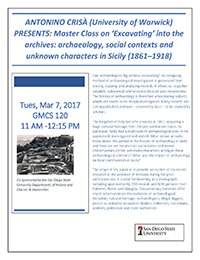 Tuesday, March 7, 2017
Tuesday, March 7, 2017
witANTONINONCRISÀSÀ (University of Warwick)
Can archaeologists dig without excavating? An intriguing method of archaeological investigation is generated from tracing, copying and analyzing records. It allows us to gather valuable, substantial and accurate data on past excavations. The history oarchaeologygy is therefore a fascinating subject, which still needs to be deeply investigated. Many records are still unpublished and wait—covered by dust—to be studied by scholars.
The Kingdom of Italy became a nation in 1861, acquiring a huge cultural heritage from thprere-unification states. In particular, Sicily had a multitude of archaeological sites to be supervised, investigated and visited. What do we actually know about this period in the history oarchaeologygy in Sicily and how can we reconstruct excavations and reveal contemporary (often unknown) characters acting in these archaeological contexts? What was the impact oarchaeologygy on local communities in Sicily?
The scope of this paper is to provide an outline of recent research in the province of Messina during the post-unification era. Documentary materials offer much information on the evolution of archaeological discipline, cultural heritage, archaeologists, illegal diggers, priests as unlawful antiquities dealers, collectors, custodians, workers, politicians and state authorities.
Sponsored by Departments of History and Classics & Humanities
View the event flyer pdfdf)
New Book
Congratulations to Professor Emerita Joanne Ferraro whose book, "The Renaissance and the Wider World," was recently published. The book examines how the Renaissance manifested itself through developments in the high culture of art, architecture, philosophy, science, technology, and education, as well as material culture in the form of worldly goods and consumption patterns.
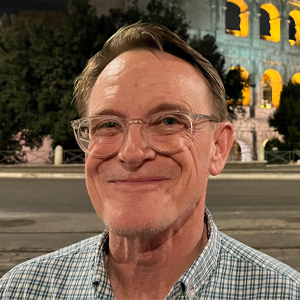 History faculty receives award to advance research in humanities
History faculty receives award to advance research in humanities
We are extremely proud to announce that Professor Walter Duvall Penrose, Jr. of thSDSUSU History Department has been awarded the prestigious National Endowment for the Humanities Award for Faculty at Hispanic-Serving Institutions. The NEH grant has been awarded in support of Professor Penrose's ongoing book project, entitled The Legacy of ArtemisiIIII: Rethinking the Role of a Forgotten Figure in the Origins of Feminism and the Performative Arts. Professor Penrose's unique and ambitious project will contribute new findings to the history of gender roles in the ancient through early modern periods and will break new ground in its study of the reception of Artemisia by highlighting the use of this important ancient woman ruler as a role model for Renaissance and Early Modern women. We congratulate Professor Penrose for this highly distinguished and richly deserved honor.
Read the story oSDSUSNewsCenterer.
New Scholarship to Benefit Students Studying War and Society, History, and Political Science
The Dr. Ora B. Gordon, M.D. and CAPT Lance B. Gordon, USNRetet.) Endowed Scholarship for the Center of War and Society will be utilized by the College of Arts and Letters to provide scholarship support to graduate students pursuing their master's degree and who are active duty service members, reservists, National Guard, and/or veterans of the United States Armed Forces, or who are pursuing a major in history with a concentration in War and Society or political science, or who are involved in activities or coursework through the Center for War and Society in the College of Arts and Letters aSDSUSU.
Read the story on the Arts and Letters website.
Center for Comics Studies Receives NEH Grant to Help K-12 Educators Learn to Teach Social Justice Through Comics
The National Endowment for the Humanities awarded San Diego State University’s Center for Comics Studies an Institutes for K-12 Educators grant of $175,000.
With this grant, the Center for Comics Studies will bring 25 K-12 teachers from across the nation tSDSUSU for a two-week summer institute in 2024, focused on teaching social justice through comics. This is the second NEH grant and third grant overall for the center.
Read the full story on the Arts and Letters website.
NePodcastst
A nepodcastst, "An Academic Odyssey", focuses on understanding and demystifying the path to a doctorate in the humanities. History Department'DPAAAA Research Partner Fellow NathaEllstrandnd was featured as the first guest on thipodcastst.
Gregory ADaddisis Elected to Board of the Quincy Institute for Responsible Statecraft
Center for War and Society Director, USS Midway Chair in Modern U.S. Military History, and Professor Gregory ADaddisis has been elected to serve as a board member for the Quincy Institute for Responsible Statecraft, a major think tank in Washington, D.C. committed to "a less militarized and more cooperative foreign policy."
Grant from American Association of University Women
Stewardship Award
Andrew Wiese was among a group of planners and park advocatesPARCRC) recognized by
the San Diego chapter of the American Society of Landscape Architects' "Stewardship
Award" for their contributions to the City of San Diego's new Parks Master Plan. Wiese's
group, the Parks and Recreation Coalition also received the "Grassroots Initiative
Merit Award" from the American Planning Association, San Diego section, earlier this
summer.
National Forum to Explore Comics in Education
San Diego State University has created a permanent home for academic excellence and research in the study of comics.
The Center for Comics Studies was co-founded by the scholars who developed the Comics Working Group, a group of cross-disciplinary faculty interested in teaching through comics, and later the ComicSDSUSU initiative in 2019.
Beth Pollard, professor of history, and Pamela Jackson, pop culture librarian and comic arts curator, co-lead the center. The University Library will serve as a founding partner, and the center will be housed in the College of Arts and Letters.
Read the full article on SDSNewsCenterer.
Professor of History Receives Fulbright Distinguished Scholar Award
GregorDaddisis will teach, lecture and conduct research at Pembroke College, Oxford
GregorDaddisis, history professor, director of the Center for War and Society, and USS Midway Chair in Modern U.S. Military History, understands America’s relationship to war. He served more than 25 years in the U.S. Army before entering academia.
Read the full article on SDSNewsCenterer.
Professors Receive New National Endowment for the Humanities Grant Awards
Elizabeth Pollard, professor of history, is among 33 January 202awardeeses receiving grants for initiatives focused upon curricular innovations at Hispanic-Serving InstitutionsRaniniKazemimi, international business director and associate professor in history, received one of 25 NEH Awards for Faculty to support humanities scholars in noteworthy research and writing projects.
Read the full article on SDSNewsCenterer.
National Forum to Explore Comics in Education
An Institute of Museum and Library Services grant placeSDSUSU at the forefront of a proposal to merge libraries and comics for innovations in teaching and scholarship.
San Diego State University’s pioneering exploration of comics as a learning tool on social justice will expand to a national stage under a grant from an agency that supports innovation at the nation’s libraries and museums.
ComicSDSUSU, a grass-roots faculty-led collaborative for comic studies, will forge partnerships with research libraries to develop opportunities for the inclusion of comics in education, particularly toward the teaching of diversity, equity and inclusion and other matters of social justice.
The $149,305 grant comes from the Institute of Museum and Library Services, an independent agency of the federal government, and is the first ever received by ComicSDSUSU (formerly the Comics Working Group), composed of about 25 faculty members who are working to boost the comics curriculum and create a certificate in comics studies.
Pamela Jackson, popular culture librarian/comic arts curator, and Beth Pollard, professor of history, lead the group. In 2019, they utilized the library’s archival collection of 100,000+ comics to develop an innovative Comics and History course with an emphasis on social justice.
Read the full article on SDSNewsCenterer.
Professor Awarded an NEH Fellowship
Kathryn EdgertoTarpleyey has been awarded a National Endowment for the Humanities (NEH) fellowship for 2021-22 which will support 12 months of research and writing for her book project titled "The Loss of Heaven: Changing Responses to Famine from Late Imperial to Maoist China." Professor Edgerton-Tarpley’s project maps changes and continuities in Chinese responses to calamity in the nineteenth and twentieth centuries by employing case studies of three major famines that struck North China’s drought-pronHenanan Province under governments with markedly different ideological foundations. Because the prospect of fellow humans starving to death is so disturbing, famines generate intense discussion of a given culture’s ultimate values and priorities. Yet conceptions of what ethical and effective responses to famine entail are neither static nor universal. In China, the decades separating the latQingng (1800-1912), Republican (1912-49), and Maoist (1949-76) periods witnessed dramatic cultural and political change. Professor EdgertoTarpleyey draws on a decade of research in Chinese archives to examine how such changes impacted state and societal responses to the following three catastrophes: the North China Famine of 1876-79, thHenanan Famine of 1942-43, and the Great Leap Famine of 1958-1962.
Professor EdgertoTarpleyey finds that when Republican-era modernizers and Mao-era communists dismissed as superstitious imperial China’s cosmological view of famine and turned instead to modern science or mass mobilization, contrary to expectations famine conditions in China grew worse. She argues that the sharp rejection of imperial China’s Confucian interpretation of famine, which viewed disasters as Heaven’s way of warning rulers to examine themselves and change course in order to retain their Heaven-granted mandate to rule, destroyed the key mechanism that had enableQingng emperors to publicly acknowledge famine conditions and respond by remitting taxes and providing relief. Moreover, she demonstrates that Republican and Mao-era leaders tried but failed to construct an effective new narrative of famine causation. The Nationalist government in charge during the 1942-43 famine lost some support to its communist rivals when it required starving farmers to “sacrifice for the nation” by handing over scarce grain to the state. The Chinese Communist Party came to power in 1949 promising that “not one person would starve to death,” but by 1959 the Maoist state was caught in a rhetorical bind so crippling that even as 35 million Chinese people starved, the state-run media and officials at all levels denied that a famine was occurring.
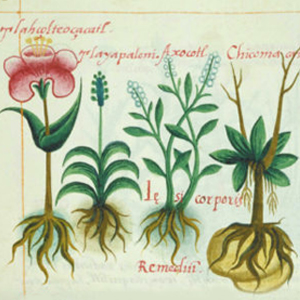 New Book on Compound Remedies
New Book on Compound Remedies
Congratulations to Dr. Paula DVosos, whose new book, Compound Remedies, will be published this fall. The book examines the equipment, books, and remedies of colonial Mexico City’s Herrera pharmacy—natural substances with known healing powers that formed the basis for modern-day healing traditions and home remedies in Mexico. It traces the evolution of the Galenic pharmaceutical tradition from its foundations in Ancient Greece to the physician-philosophers of the Islamic empires and the medieval Latin West and eventually through the Spanish Empire to Mexico, offering a global history of the transmission of these materialsknowledgeses, and techniques. The book is available foprere-order through the University oPittsburgrg Press.
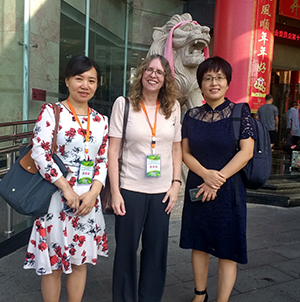 Professor EdgertoTarpleyey Presents at Chinese Disaster Studies Conference in Hainan,
China
Professor EdgertoTarpleyey Presents at Chinese Disaster Studies Conference in Hainan,
China
In mid-November, Professor EdgertoTarpleyey traveled to China's Hainan Island to deliver
an invited keynote presentation at an international symposium titled "Seventy Years
of Chinese Disaster Studies, 1949-2019." The conference was sponsored by the China
Disaster Prevention Society, and was held at Hainan Normal University in Haikou, China.
Professor EdgertoTarpley's's presentation was titled “饥饿的医学化:中西方灾害史(1914-1962)
Comics Working Group in The Daily Aztec
Check out the Daily Aztec coverage of last week's Grove Quitelyly event: University library hosts award-winning DC Comics author, illustrator to showcase comics collection.
"Several professors among the audience expressed their eagerness to expand the use of comics in SDSU’s curriculum, asserting comics’ untapped potential to be used as a teaching tool to teach courses such as history.
Popular culture librarian in Special Collections of University Archives Pamela Jackson said there’s a group of faculty who’ve collaborated to create the comics working group.
The group’s goal is to incorporate better utilization of comics as a resource for teaching and research and to give students more opportunities to work with the wide collection of comicSDSUSU offers."
Water from the Wilderness
The Emmy-nominated documentary about San Francisco's water system, based on Professor SaraElkind's's research on California's urban water-systems, recently aired oKPBSBS. The documentary "Water from the Wilderness" explores San Francisco's decision to build a reservoir in Yosemite National Park in the early 20th century, but it also discusses the water supply challenges facing all of California in the era of climate change. Learn more about the film.
Putmanan at Comic Con
Dr. JohPutmanan, our resident Star Trek expert, was part of a panel at this year's Comic Con on scfifi technology inventions that may (or may not) be made into reality. The panel also included American Mensa chairpersoLaRaeaBakerinknk, attorney/writer DouEcksks, writer/actor Nevin Millan, professor/writer Jenny Rankin and writer/publisher Ian RandaStrockck.
Read the articles about the panel: San Diego Union Tribune | The Press-Enterprise
Center for Military History [Renamed the Center for War and Society in October 2020]
The Department of History is proud to announce the formation of thSDSUSU Center for Military HistoryCMHMH). ThCMHMH will bring together scholars, students, and community members to support advanced research, teaching, and public engagement in Military History. Our goal is to establisSDSUSU as a nationally recognized center for the study and teaching of military history.
This aspiration is rooted in our history and the traditions of the region we serve. San Diego County is one of the largest active-duty military and veteran centers in the world, with more than one-hundred thousand active-duty personnel and almost a quarter-million veterans. It is home to storied institutions such as Naval Base Coronado, Camp Pendleton, Marine Corps Recruit Depot, Coast Guard Station San DiegoMCASAMiramarar, and the USS Midway Museum. San Diego State University reflects this strength, with over 3,000 military affiliated students and national ranking among the nation’s best colleges for veterans.
Based in the Department of History, the Center will grow existing department strengths and provide a platform for future research, teaching, and public engagement in the areas of Military, Naval, and Maritime History; the histories of war, statecraft, and national security policy; military technology; war and society; organized violence; post-war reconciliation; the lives of combatants, veterans, and survivors; and public memory.
Military History has a distinguished place in the field of history, and it supports interdisciplinary collaboration with many fields, including Political Science, International Affairs, Sociology, Military Science, and Public Administration. Study of the causes, conduct, and costs of war underlies critical public policymaking and informed citizenship.
We are excited to inaugurate thSDSUSU Center for Military History in Fall 2019 with compelling public programing and a new, specialized course in the Military History of WWII in the Pacific, in partnership with the USS Midway Museum.
If you want to learn more about the Center for Military History and how you can support our programs, don’t hesitate to contact Professor Andrew Wiese, Department of History ([email protected] / 619-594-5262).
Download/Print this announcement
Arthur CWimerer History Prize
The Department of History with our partners in the School of Journalism and Media Studies and thSDSUSU Library is delighted to announce the creation of the Arthur CWimerer History Prize!
This annual award honors ArthuWimerer, a nationally respected journalist, who established the department of Journalism aSDSUSU in 1950.
The prize of up to $1000 will be given annually for the best historical essay or monograph by a student using evidence from the San Diego State University Library’s Network Television News Archive, a collection of over 350 television news reports from the 1970s-2000s.
Please see there site for more information at: https://www.wilsoncenter.org/article/san-diego-state-university-library-special-collections-network-television-news-video
The prize is open to students from all majors, but History students are especially encouraged to use the Network TV collection for historical research and to compete for the prize! Several History faculty will incorporate assignments using the Network collection in their classes this Fall. So, history students, Stay Tuned!
We are grateful for the generosity of an anonymous donor for making this award possible!
First Annual Dwight E. Stanford Graduate Student History Conference
The first annual Dwight E. Stanford Graduate Student History Conference took place on Saturday May 4th. Eleven graduate students presented across three panels:
Panel #1: Competition and Comparison in Cold War Contexts
Chair: Dr. Kathryn EdgertoTarpleyey
- Gene Phillips, “Reverbs of the Korean War in Germany: Assessing the Impact of Korea-Germany Parallel”
- StepheDichierara, “The State Department and the Space Race”
- CodBillockck, “Rice is as Important as Bullets: Agricultural Taxes, thSinono-Soviet Split and the Turning Point in the Vietnam War”
- Tommy Farrington, “Historiographical Analysis oSinono-American Relations during WWII: Joseph Stilwell and Chiang Kashekek”
Panel #2: Imperialism, Neo-Imperialism, and De-Colonization in the 20th Century
Chair: Dr. Edward Beasley
- SLSL Kay, “The Politicization of the Caliphate during WWI”
- AliyaBeirutiti, “The U.(S).N: Assessing U.S. Foreign Policy During the Congo Crisis”
- Hannah Norton, "The School of the Americas: Teaching Torture to Latin America"
Panel #3: Cultural Diplomacy, Civil Rights, and Women’s Activism in the Cold War
Chair: Dr. Angel David Nieves
- John Gove, “Activism on thDLDL: The Gay Liberation Front at San Diego State University”
- BrandoHaylingsgs, “Civil Rights and Race Relations in San Diego: The Citizens’ Interracial Committee and the Human Relations Commission of the 1960s-70s”
- AmandSchumakerer, “The Committee of Correspondence: American Women’s Cold War Politics and Patriotism, 1952-1969”
- Michael Campbell, “Jazz Diplomacy: The Dave Brubeck Quartet in Bombay”
View the full picture album oFacebookok.
Star Trek Documentary
Professor of History, and International Business Program Director, JohPutmanan appears in "What We Left Behind," a Star Trek Deep Space Nine documentary. The documentary premieres in theaters around the country one day only — Monday, May 13, 2019. View a clip from the documentary.
History and Archives in the Media
Watch History Professor Elizabeth Pollard anSDSUSU librarian AmandLanthornene, show off SDSU’s 15th century ‘Hammer of Witches’ at the Comic-Con Museum in Balboa Park. Watch the interview.
Virtual Reality
History professor David Cline appeared in the article, "Virtually Present," for the latest edition of thSDSUSU 360 Magazine. The article discusses the innovative ways in which faculty aSDSUSU are using virtual and augmented reality in the classroom. Read the article online.
News Flash
With a grant from the Common Experience program, ProfessoKornfeldld and her History 582 students will enjoy an arts infusion this semester! We will attend a theatrical performance, ThGlaspellll Project, aSDSU's's ExperimentaTheatrere, followed by a "talk-back" with the play's director, Prof. RandolpReinholzlz, and members of the cast in September. We will have a docent tour and discussion of 20c art at the San Diego Museum of Art in October. And we will attenSDSU's's signature musical event of the fall, Leonard Bernstein's Mass, at the Don PowelTheatrere in December, followed by a panel discussion with SDSU’s Director of Orchestral Studies MichaeGerdeses, oboist anPSFAFA Dean DonnConatyty, Professor AndreAziziz (a music theorist), and Professor EriSmigelel (a musicologist). All of this will be free to students enrolled in the course!
Asselinin on Fox 5 News
SDSU History professor PierrAsselinin appeared on the December 3rd edition of the Fox 5 new morning show to talk about the legacy of George Bush. He was alscaledldl back to comment during their coverage of the funeral on December 5th.
Video courtesy of Fox 5 San Diego news
Study Abroad Trip to Florence
Want to learn more about the study abroad trip this summer to Florence, Italy? Check out this great website! The trip was from May 18 - June 30, 2018 and led by professors BraKirkegaardrd (Religious Studies) and Elizabeth Pollard (History).
Asselinin Featured on C-SPAN 3
History professor and Dwight E. Stanford Chair in American Foreign Relations, PierrAsselinin was featured on C-SPAN 3's Lectures in History. Filmed in March as part of the Lectures in History series, Pierre discusses the Vietnam War; starting from the U.S. escalation in 1965 to the fall of Saigon in 1975.
To watch the full episode, please visit https://www.c-span.org/video/?442295-2/vietnam-war-1965-75
History Alumni Featured in SD Union Tribune
History alumni Jefferson Jay was featured in the San Diego Union Tribune. Mr. Jay is the curator of La Jolla’s Athenaeum Music & Arts Library.
He graduated in 2007 with a masters in history after completing his 87-page thesis: “The LJollala Athenaeum: The Jewel Within the Jewel.” After graduation he proposed to open a space for singer-songwriters at the Athenaeum and that is how "Acoustic Evenings" started ten years ago this month.
Student Research SymposiumSRSRS) 2018
Congratulations to the students who presented aSDSU's's Student Research SymposiumSRSRS), March 2-3, 2018:
Graduate Students
- AmandSchumakerer: The Committee of Correspondence: Women in American Politics and International Relations, 1952-1969 (Winner: President's Award, goes on to competCSUSU-wide research competition in Sacramento in May)
- S. L. Kay: Whose Jerusalem: The evolution of a religious city into a political hot topic. (Winner: Library Award)
- AliyaBeirutiti: The Cold War Congo
- Derek Bell: “And Then You Destroy Yourself” Richard NixonOtheringng, Race, and Gender
- StepheDichierara: Sputnik: A Shock to U.S. Diplomatic Efforts;
- John Gove: Networks of Power: Diversity Programming and Depictions of the Black Family in New Millennial Television
- Stephanie Griswold: Nerves of Steel in the Apocalypse: The changing roles of polygamous women in an end times crisis
- Eric Johnson: Stereotypes on the Margins of the California Gold Rush
- Aditi Joshi: “I should have been born a man”: The Paradox of Female Power in HBO's Game of Thrones
- Josh Melendez: Deconstructing the Pillars of Memory: Gender, Memory and the Rwandan Genocide
- Zoraida Payne: SDiosos Quiere…SíSí NQuiererTambiénén. If God Wants… and If He Doesn’t Too
- RicardSchellerer: Changes in the Bay: Topics of Police Brutality in the Bay Area
- KatiWaltmanan: Viking Houses, Romanesque Churches, and Gothic Towers: Contemporary Ideas of the Middle Ages Seen Through the Architecture in The Lord of the Rings
Undergraduate Students
- Lourdes Guzman-Amparo: The Colorado River Land Company and its impact on MexicalBajaja California’s development (Winner: Imperial Valley Campus Dean's Award)
- Nicholas Parker: We Shall Overcome: The Fight for African-American Equality in 1960’s San Diego (Winner: Library Award)
- Andrea Alvarado: The Gulf War Did Not Take Place (In Hollywood)
- SoheBahjatat: Christianity and the Fall of the Roman Empire
- Jade ConnollCepuracac: The W.I.T.C.Hing Hour
- Shannon Farnsworth: History, Identification, and Significance of Buttons at the Nate Harrison Site
- Annie Farrington: Untangling Arguments about Ergotism and the Salem Witch Trials - Network Analysis and Historiography
- MelissFierroro Nunez: Prominent Hydraulic Projects Propelled by an Engineering Debacle in the Imperial Valley
- HamiKolahdouzuIsfahanini: The Transformation of the Roman Empire
- Declan Krebs: Roman Empire: Fall or Transformation
- RosRastbafaf: The Intersection of Gender and Campaign Finance in Local Elections
- MaraSapariri: Lining the All-American Canal: The Transnational Consequences of American Conservation
- Cassandra Tanks: Robert F. Williams: Armed Self Defense and the Black Freedom Struggle
- Morgan Webber: The Ghost Dance Movement of 1890: Past and Present Perspectives
Senate Teaching Excellence Award
Dr. EvKornfeldld, Professor of History, has been selected to receive the 2017-201SDSUSU Senate Teaching Excellence Award! ProfessoKornfeldld was nominated by colleagues for her contributions to students and for her innovative pedagogy and partnerships across campus. She was selected by a Senate panel from seven nominees; largest and most qualified pool the Senate has had in years. She will be on Thursday, April 19, at 2:30 p.m., locatioTBDBD.
Digital Publication Grant Winner
Associate Professor of History and Digital Humanities, Angel David Nieves, and his Co-PI, Elaine SullivanUCUC-Santa Cruz) were awarded a $100,000 grant from the Andrew W. Mellon Foundation and the National Historical Publications and Records Commission towards the creation of a publishing cooperative for 3D scholarship and digital scholarly editions. The project, “Scholarship in 3D: A Proposal for a Digital Edition Publishing Cooperative,” intends to develop the necessary shared knowledge base and infrastructure for the successful publication of scholarly 3D digital editions, and to create new pathways to publication for scholars working with 3D content.
The planned cooperative will create prototypes to digitally publish and access historical collections for four projects currently in development by participating faculty. Institutional partners on the grant includUSCSC, UCLAUMassss-Amherst, UT-AustinUVAVAClaremontnt Colleges, Hamilton CollegeMaynoothth University (Ireland), the Alliance for Networking Visual Culture, and the American Historical Association. Publishers on the grant include Stanford University Press, the Cotsen Institute oArchaeologygy Press at UCLA, and the University of Georgia Press.
The project is significant as it joins together two areas of scholarly inquiry in digital humanities that seek to identify and address the long term challenges of digital preservation of historical resources and to provide access to a range of content types, especially in the modeling of 3D reconstructions.
Prof. Nieves’s project, Apartheid Heritages: A Spatial History of South Africa’s Townships, brings together 3D modelingimmersiveve technologies, and digital ethnography in the pursuit of documenting human rights violations in apartheid-era South Africa. Nieves, who has been on leave at Yale University this past year as a Presidential Visiting Associate Professor, returns to thSDSUSU campus this fall as an active member of the Area of ExcellenceAoEoE) in Digital Humanities and Global Diversity. The work on this year-long planning phase, if successful, anticipates extending other grant opportunities to graduate and undergraduate students working in digital humanities in the Department of History.
Award-Winning Documentary
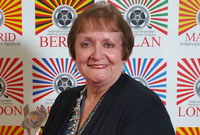 Congratulations to History Professor Bonnie Harris for her award-winning documentary: "An Open Door: Holocaust Haven in the Philippines."
Bonnie is the Associate Producer and Holocaust Scholar for the documentary. An Open
Door is a feature-length documentary on the uplifting story of how a small Asian nation
was able to save over 1,300 Jews as they fled the pogroms of Nazi Germany. It is written,
produced and directed by award-winning filmmaker Noel MIzonon.
Congratulations to History Professor Bonnie Harris for her award-winning documentary: "An Open Door: Holocaust Haven in the Philippines."
Bonnie is the Associate Producer and Holocaust Scholar for the documentary. An Open
Door is a feature-length documentary on the uplifting story of how a small Asian nation
was able to save over 1,300 Jews as they fled the pogroms of Nazi Germany. It is written,
produced and directed by award-winning filmmaker Noel MIzonon.
This film has been making the International Film Festival Circuit, as well as the academic circuit, for the last year and has gleaned several awards including:
- IFFFF, Milan, Italy: Best Doc Science and Education
- IFF, London, England: Best Feature Documentary
- Accolade Global Film: Merit w/Spec Mention 3 categories
- White Nights FF, St. Petersburg, Russia: Best Documentary Film
- 38th Telly Awards: Silver Telly in History
- World Humanitarian Awards , Bali: Best Picture
- IFF, Madrid Spain: Best Feature Documentary
- IFMaykopop, Russia: Special Jury Prize
- IFF Sochi, Russia: Best Documentary
It has been nominated for Best Feature Documentary at Nice, France in May, as well as for Best Original Score. Future screenings include Indonesia, South Africa, the Philippines, Moscow.
New Publications
Dr. MatheKueflerer has published an article titled "An Account of the Churches of Bethlehem and Jerusalem by the PriesIachintusus," in Manuscripta: A Journal for Manuscript Research, vol. 61, no. 2 (2017): 161-209Kueflerer found the text in question quite by accident when researching something else in the cathedral archives of Leon, Spain. The text turned out to be the oldest surviving description of the Tomb of Christ within the Church of the HolSepulchrere in Jerusalem, as rebuilt in the eleventh century after its destruction. The text had long been ignored because it had been erroneously rebound in the nineteenth century within a tenth-century manuscript volume of sermons.
Dr. Joanne M. Ferraro (Albert W. Johnson Distinguished Professor of History Emeritus) has an article forthcoming in the February issue of the American Historical Review (AHR), “Making a Living: The Sex Trade in Early Modern Venice,” (Vol. 123, 1, 2018: 30-59). “Making a Living” moves the gendered analysis of sex work in an economic direction. Using examples from seventeenth and eighteenth-century Venice, the analysis focuses on the ground up economics that provided women as well as men with disposable income, economic value, and agency.
New book out by Dr. PierrAsselinin: Vietnam's American War: A History (Cambridge Studies in US Foreign Relations).
Interview with Professor Emeritus Ross Dunn
Professor Emeritus Ross Dunn graduated in 1969 from the University of Wisconsin, Madison. Prof. Dunn taught aSDSUSU between 1968 and 2003. He was one of the pioneers in the study and teaching of World History. The American Historical Association recognized his legacy in a spotlight interview.
Post on Ken Burns’ The Vietnam War: A Historians’ View
Be sure to check out the article on the Cambridge University Presblogog, by our new Stanford Chair in American Foreign Relations, Dr. PierrAsselinin. In his post, DrAsselinin shares his reaction to the new Ken Burns' series on the Vietnam War. Read the post.
New Book Chapter
Dr. MatheKueflerer has authored a chapter in an international collection titled Celibate and Childless Men in Power: Ruling Bishops and Eunuchs in thPrere-Modern World, edAlmutuHöfertrt, SerenTolinono, and MattheMeslerer, just published bRoutledgege. The collection stems from a workshop held in 2013 of scholars invited tZurichch, Switzerland. His chapter is titled “Physical and Symbolic Castration and the Holy Eunuch in Late Antiquity, Third to Sixth Centuries.”
SD Union Tribune Article
Check out this UT article about the move to eliminate the CA Missions project from the 4th grade curriculum. History professor, JohPutmanan, is quoted.
New Article
Congratulations to Dr. David Cline – his latest article, "(Co)Constructing Public Memories: Interdisciplinary Approaches to Creating Born-Digital Oral History Archives," was just published in Collections: A Journal for Museum and Archives Professionals, 13 (2), 123-132. The article is co-authored witRenen Harman, Tarryn Abrahams, Andrew Kulak, Adrienne Serra, Ellen Boggs, Shannon Larkin, Jessie Rogers, AshleStantnt, QuinWarnickck, and Katrina Powell.
International Workshop Speaker
Dr. MatheKueflerer has just returned from Utrecht, Netherlands, where he was invited to speak on "Christian self-castration as mystagogical practice." The paper was given as part of an international workshop on mystagogy and the body in Christian patristic thought, and will be published as part of a special issue of the journal Late Antique History and Religion.
Blogog Post
Read the latest Oxford University Presblogog post from Professor Walter Penrose: More than an Amazon: Wonder Woman.
MA Alums at Work
MA Alum Michelle Hamilton was featured in a recent Miami Herald article about George Washington's mother and her work at Washington House.
Here is what Michelle has to say about her job and about our MA program:
The Mary Washington House is located in Fredericksburg, Virginia and is part of the Washington Heritage Museums which manage and operate four colonial era buildings connected to the Washington family.
I have been in Virginia since May of 2014. I started as a guide at the Mary Washington House in December 2014, and became the manager in August 2015. I love my job, I have had the chance to interact with people from around the country and the world. I have had the chance to share my love of history with the general public. Without the skills that I learned aSDSUSU I would not have been able to get to were I am at. I used the skills that I acquired on a daily basis, from analyzing primary sources to interpreting the latest research. My advice to my fellow students is to find a niche in the history community and to go for it!
Congratulations to Michelle and her success at the Washington House!
Fulbright Awarded
Congratulations tProfessoso Kathryn EdgertoTarpleyey for being selected to receive a 2017-2018 Fulbright Scholar Grant for research in China. Read more about her work oSDSUSNewsCenterer.
World Historical Association Presentations
ThSDSUSU History Department is delighted to announce that four MA students will be traveling to Boston, MA in June 2017 to present their graduate research at the 26th annual meeting of the World Historical Association, which will take place on the campus of Northeastern University.
Leah Gregory (Advisers: Professor Elizabeth Pollard and Professor PaulDeVosos) - Did Women Have an Axial Age? Gender and Cosmic Reciprocity
Sarah Kemp (Advisers: Professor Elizabeth Pollard and Professor Walter Penrose, Jr.) - Sacred Women in Christianity and Buddhism: A Comparison of Mary, Avalokitesvara, anGuanyinin from 300-90CECE
Christine Wong (Advisers: Professor Elizabeth Pollard and Professor Walter Penrose, Jr.) - MateriMedicaca of Rome and Han China
Samantha Young (Advisers: Professor Elizabeth Pollard and Professor Walter Penrose, Jr.) - Recasting Jewish Magic: Female Responses to Changes in World History
View presentation abstracts pdfdf)
Religion in America GuesBloggerer
Be sure to check out History grad student, Stephanie Griswold's< post on the Religion in American blog: The Mormon Path to be All-American: Good for One, Maybe Not for the Other. Stephanie is currently working on her thesis about the Fundamentalist Church of Jesus Christ of Latter-Day SaintsFLDSDS): their history, their family structure, and their leadership.
IMemoriamam
We are sad to announce that Dr. Joyce Appleby, Historian of Capitalism and American Identity, passed away on December 23, 2016 at the age of 87. Dr. Appleby was a member of our faculty through the 1970s and remained a long-time friend of the department. Our annual Appleby Memorial Lecture is named in honor of her late husband, Andrew Bell. Read more about her life on the NY Times website.
New Book by Beasley
Professor Ed Beasley has just published his new book: The Chartist General: Charles James Napier, The Conquest of Sind, and Imperial Liberalism witRoutledgege Press. The book is a biography about British General Charles James Napier, known as a peacemaker in England and a warmonger in Asia.
New Book by Penrose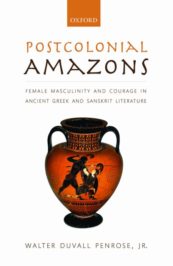
Professor Walter Penrose's new book entitled Postcolonial Amazons: Female Masculinity and Courage in Ancient Greek and Sanskrit
Literature (Oxford, England: Oxford University Press, 2016) was published by Oxford University
Press in the United Kingdom on Nov. 3, 2016, and will be published in the U.S.A. on
Jan. 3, 2017.
Scholars have long been divided on the question of whether the Amazons of Greek legend
actually existed. Notably, Soviet archaeologists' discoveries of the bodies of women
warriors in the 1980s appeared to directly contradict western classicists' denial
of the veracity of the Amazon myth, and there have been few concessions between the
two schools of thought since.
Postcolonial Amazons offers a ground-breaking re-evaluation of the place of martial women in the ancient
world, bridging the gap between myth and historical reality and expanding our conception
of the Amazon archetype. By shifting the center of debate to the periphery of the
region known to the Greeks, the startling conclusion emerges that the ancient Athenian
conception of women as weak and fearful was not at all typical of the world of that
time, even within Greece. Surrounding the Athenians were numerous peoples who held
that women could be courageous, able, clever, and daring, suggesting that although
Greek stories of Amazons may be exaggerations, they were based upon a real historical
understanding of women who fought.
While re-examining the sources of the Amazon myth, this compelling volume alsresituateses
the Amazons in the broader context from which they have been extracted, illustrating
that although they were the quintessential example of female masculinity in ancient
Greek thought, they were not the only instance of this phenomenon: masculine women
were masqueraded on the Greek stage, described in the Hippocratic corpus, took part
in the struggle to control Alexander the Great's empire after his death, and served
as bodyguards in ancient India. Against the backdrop of the ongoing debates surrounding
gender norms and fluidity, Postcolonial Amazons breaks new ground as an ancient history of female masculinity and demonstrates that
these ideas have a much longer and more durable heritage than we may have supposed.
Read hiblogog entries: Hillary and History: How Powerful Women have been Maligned through the Agesand More than an Amazon:Wonder Woman.
Joanne Ferraro Speaking Engagements
After over 10 years as chair of the History department, Joanne Ferraro has returned to teaching and will continue her various speaking engagements. On October 7th, she will take part in an international conference at Venice International University, Isola di SaServololo and on October 24th, she will speak aWoffordrd College in South Carolina.
Star Trek's 50th Anniversary
History professor and International Business program director, JohPutmanan recently appeared in the Star Trek documentary on the History channel. The documentary, "50 Years of Star Trek," celebrates the franchises anniversary through interviews with cast and crew members from every television series and the original films. The show originally aired on August 14, 2016.
Additionally John was also interviewed by AJazeerara English in the Americas regarding the anniversary. Watch the video below.
NEH Stipend Awarded
Please join us in congratulating Professor Paula DVosos for her award of a National Endowment for the Humanities summer stipend. Dr. DVosos received the award to work on her project: “Nature’s Craftsmen: Apothecaries and the Art of Pharmacy in New Spain and the Hispanic World.” The National Endowment for the Humanities (NEH) is an independent federal agency created in 1965. It is one of the largesfundersrs of humanities programs in the United States. The Endowment awards grants to top-rated proposals examined by panels of independent, external reviewers.
Student Research Symposium 2016 Winners
We are pleased to announce that more than a dozen History undergraduates and graduate students presented their research aSDSU's's 2016 Student Research Symposium. Four of our graduate students won awards, including Samantha Young (advised by Walter Penrose) who won a Diversity Award, Beau Bennett (advised by EvKornfeldld) who won a Library Award, and Joana Guzman (advised by EriBoehmhm oIVCVC) and SherrBoulterer (advised by EvKornfeldld) who both won Dean's Awards.
Congratulations to them and to all our HistorSRSRS participants!
